A US trade deal poses the greatest risk to food safety since mad cow disease 20 years ago, shoppers are being warned, after Boris Johnson’s U-turn on banning low-quality meat.
The consumer group Which? has raised the alarm after the government dumped its promise to outlaw chlorinated chicken and hormone-fed beef, in search of a quickfire agreement with Donald Trump.
In a letter to the trade secretary, Liz Truss, the organisation says the UK has – since the BSE crisis of the 1990s – “led a food safety revolution” to make it a world leader in protecting the public.
Download the new Independent Premium app
Sharing the full story, not just the headlines
But it warns: “This could all be at risk depending on the approach that the government takes when it begins a second round of trade talks with the US on Monday.
“Which? recognises the benefits of trade and the benefits that could come from a UK-US trade deal – but this cannot be at the expense of our food standards and consumer confidence in what we eat.”
No less than 72 per cent of the British public does not want chlorine-washed chicken and hormone-fed beef to be allowed on sale in the UK, its survey had found.
The protest comes after Downing Street revealed a previous pledge to maintain the ban on those US products had been dropped, as talks on a trade deal with Washington ramp up.
Instead, ministers are pushing a “dual-tariff” regime, which would impose higher levies on good that fail to comply with UK animal welfare standards, arguing that would make US exports uneconomical.
But Which? said it feared a “two-tier system” which would see cheap, lower-quality food made available in schools and NHS canteens for example.
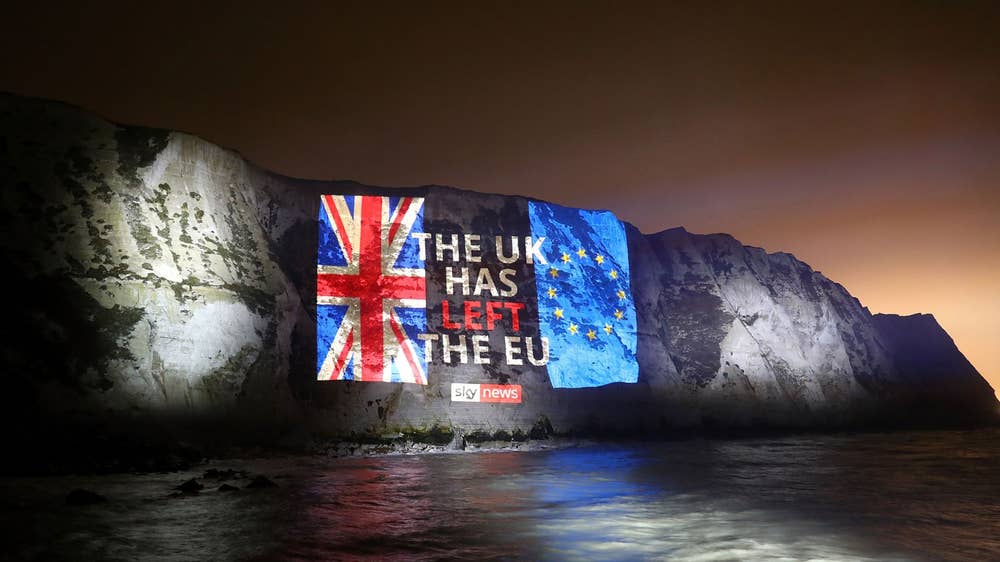
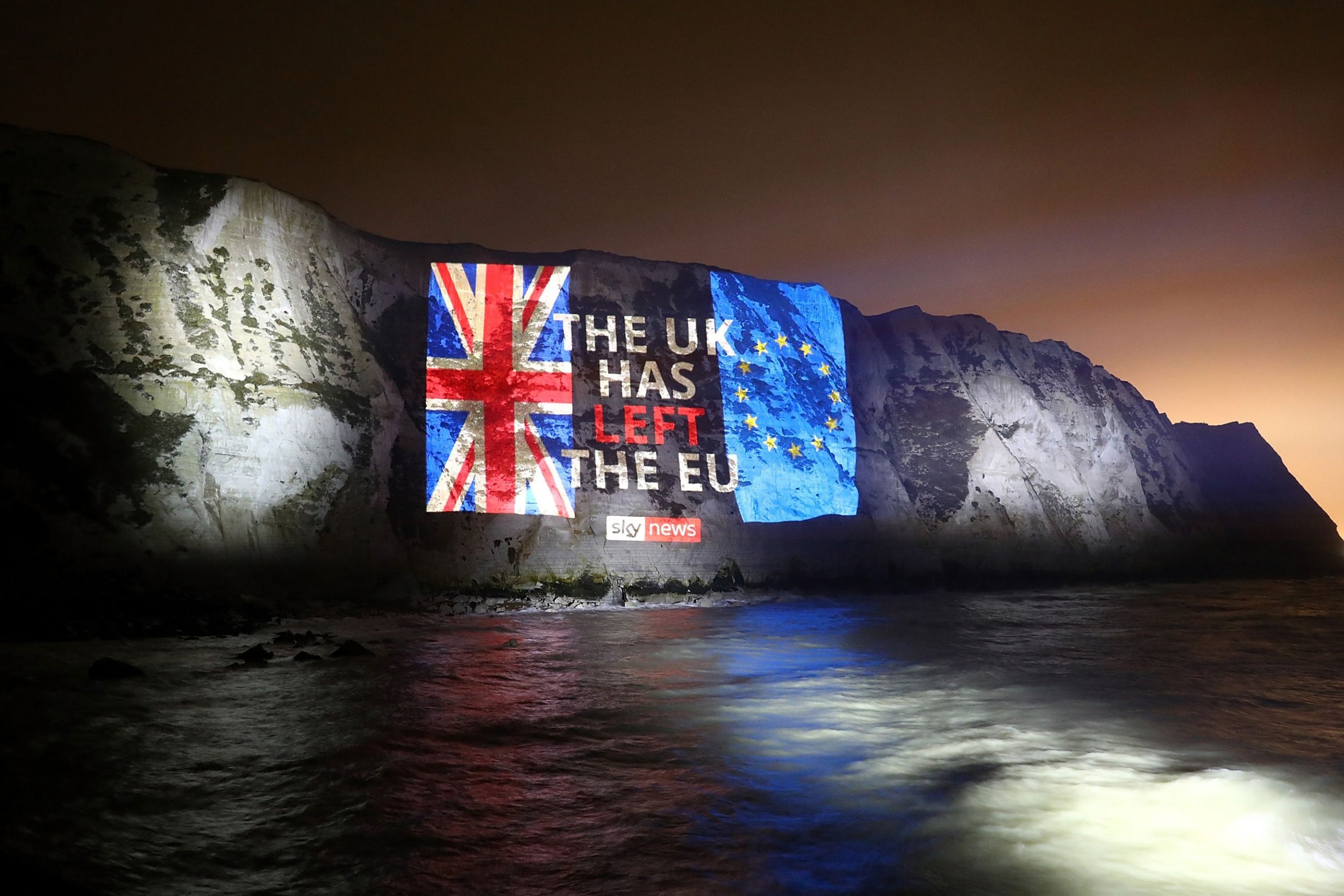
1/66
A message projected onto the White Cliffs of Dover
Sky News/AFP via Getty
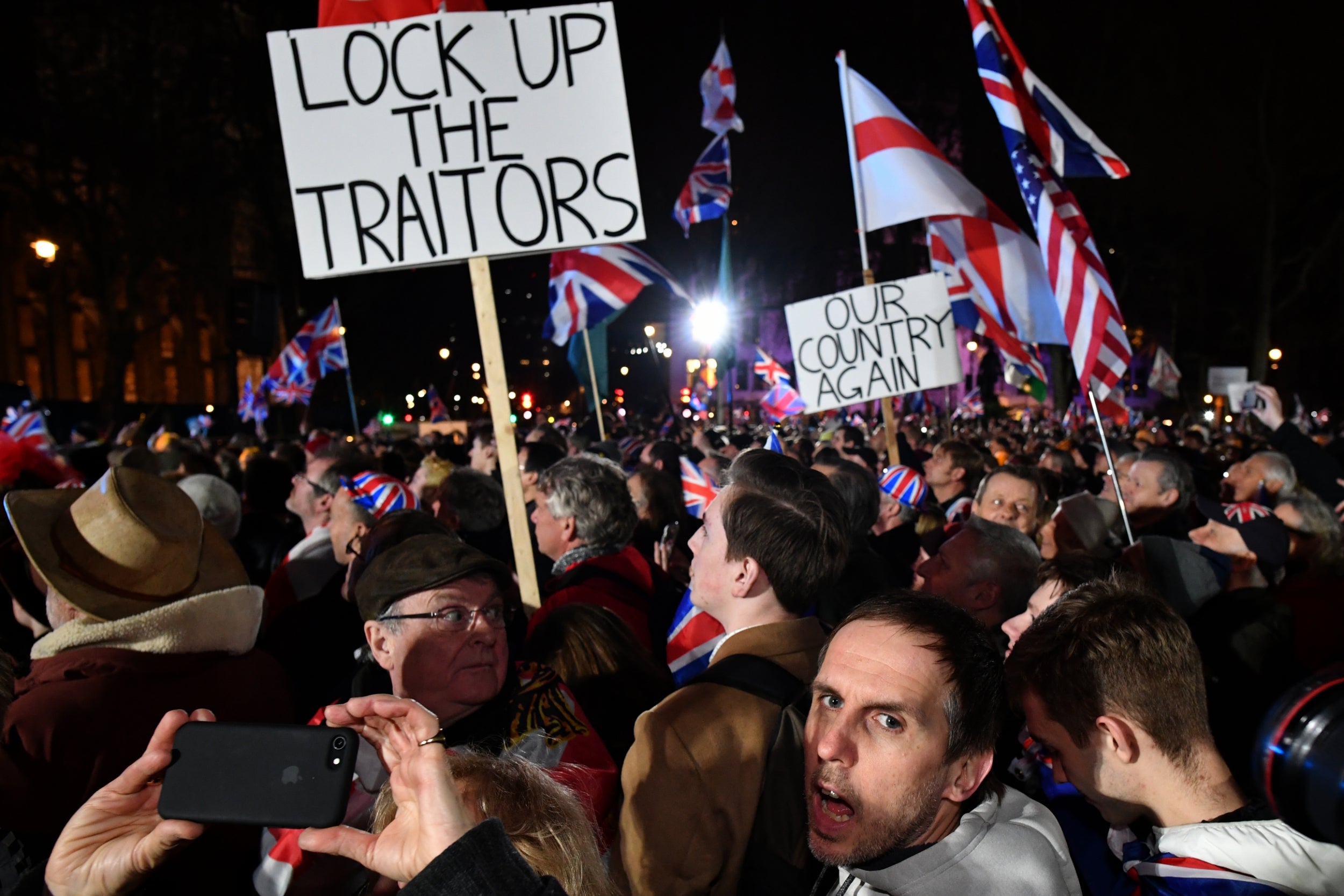
2/66
Getty
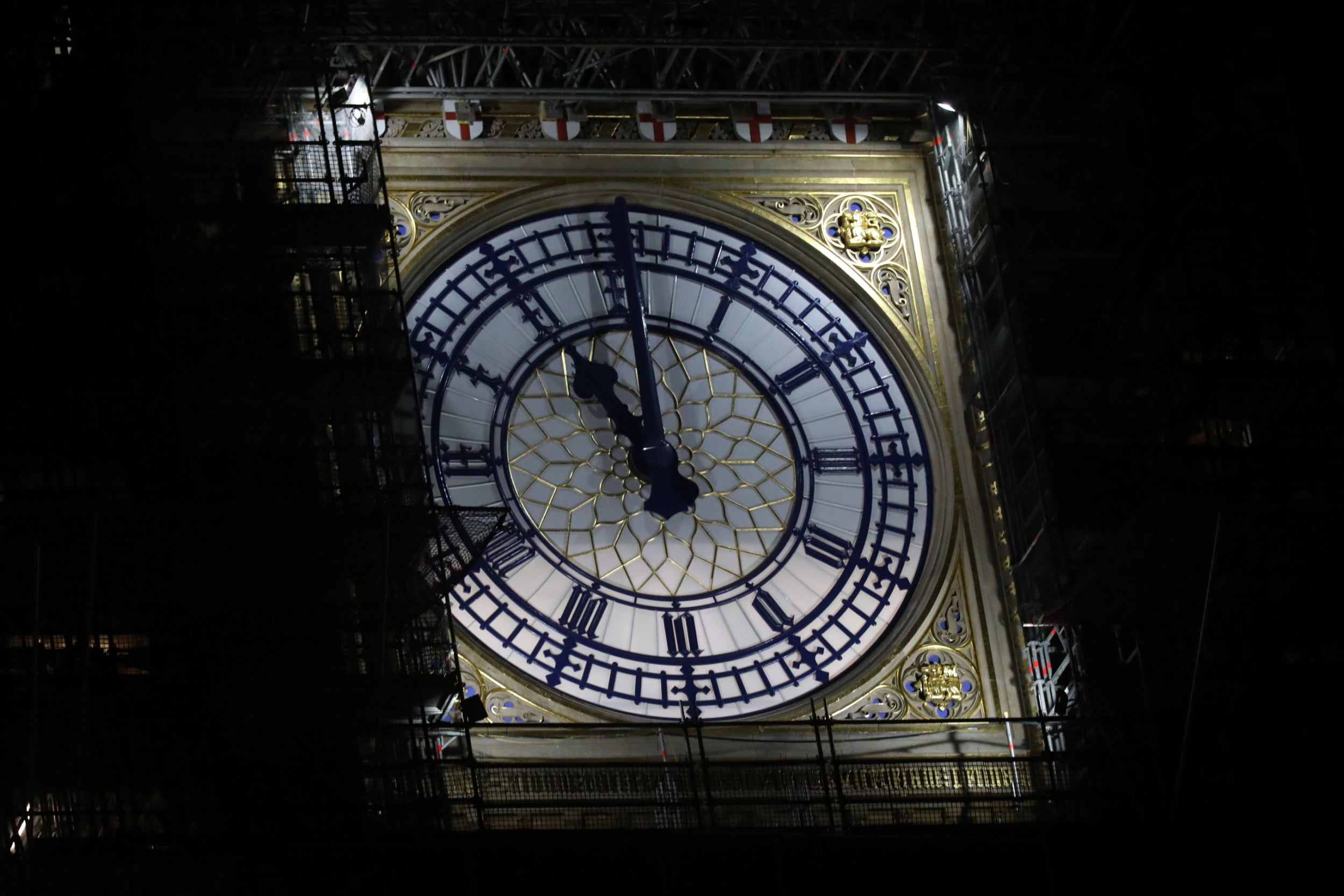
3/66
Big Ben, shows the hands at eleven o’clock at night
AFP via Getty Images
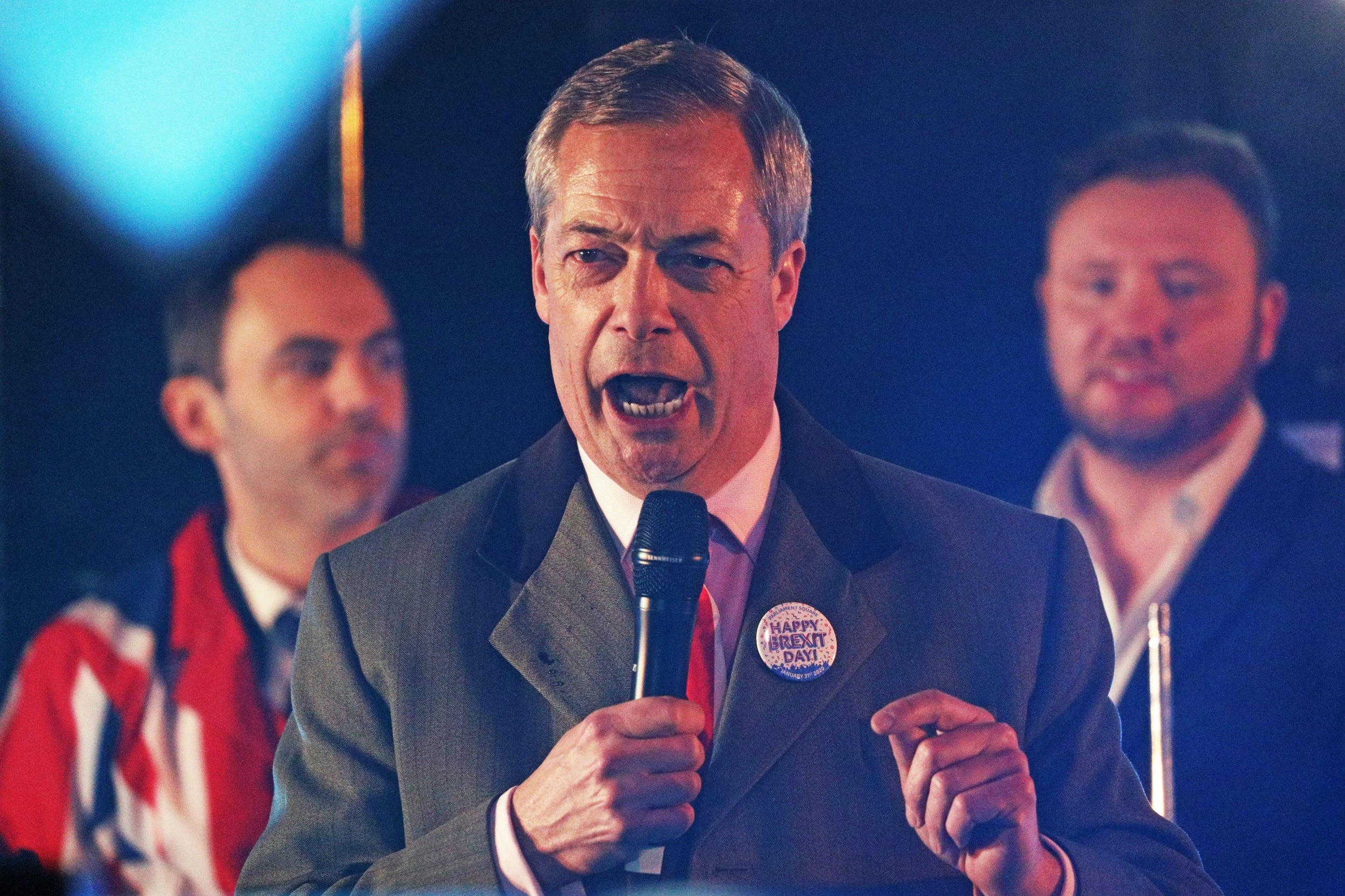
4/66
Nigel Farage speaks to pro-Brexit supporters
PA
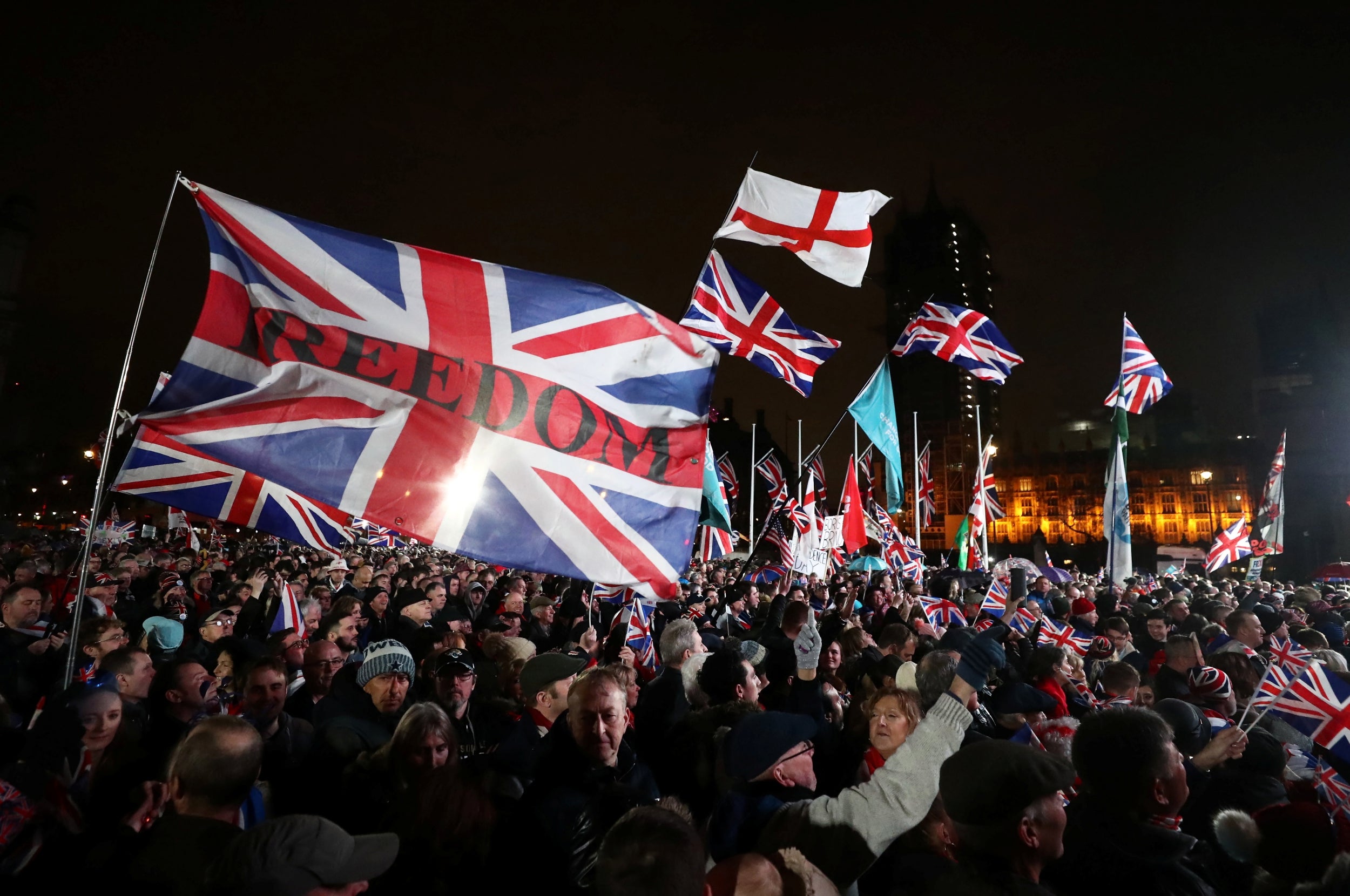
5/66
Pro-Brexit demonstrators celebrate on Parliament Square
REUTERS
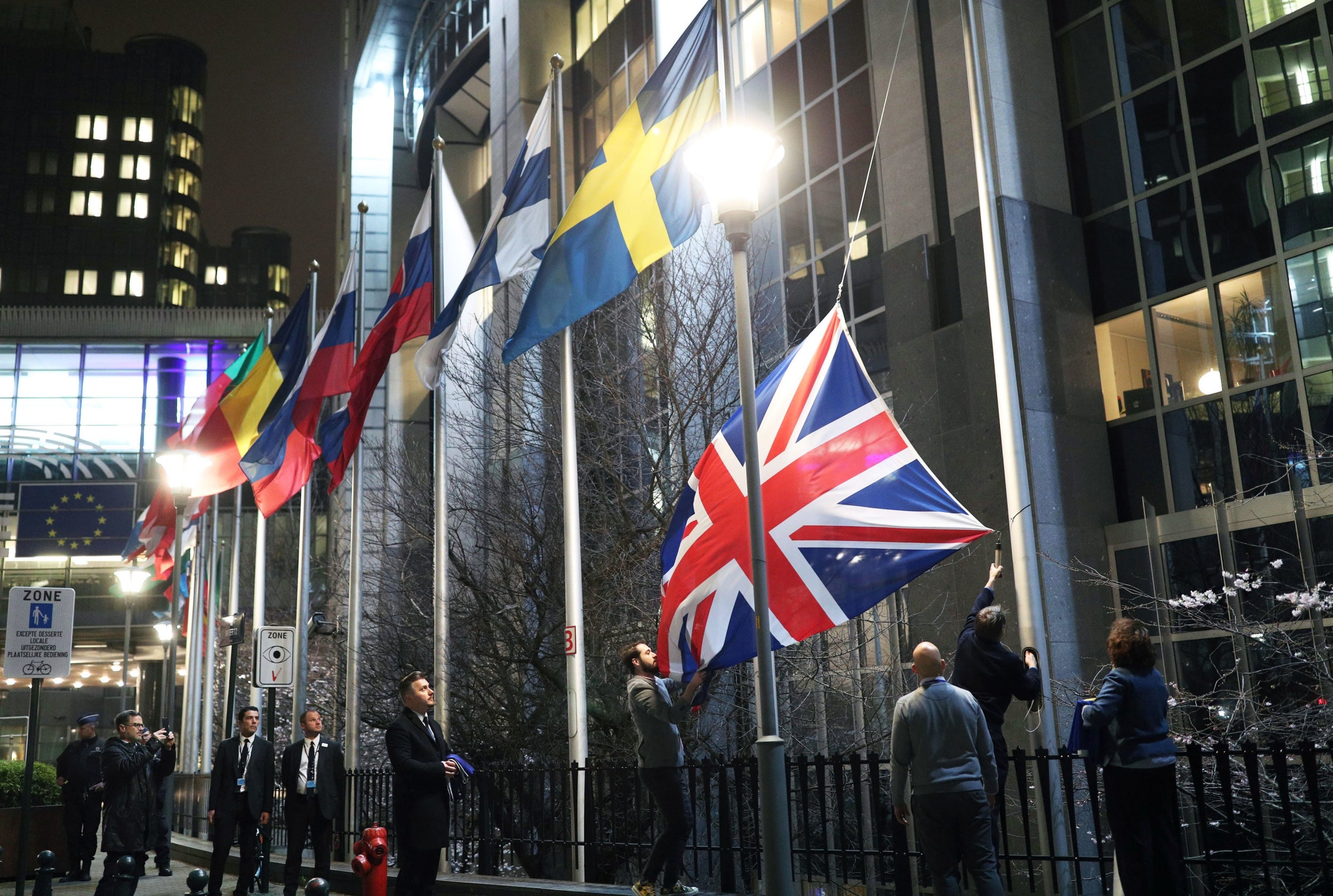
6/66
The Union flag is taken down outside the European Parliament in Brussels
PA

7/66
Pro-EU campaigners outside the Scottish Parliament, Edinburgh
PA
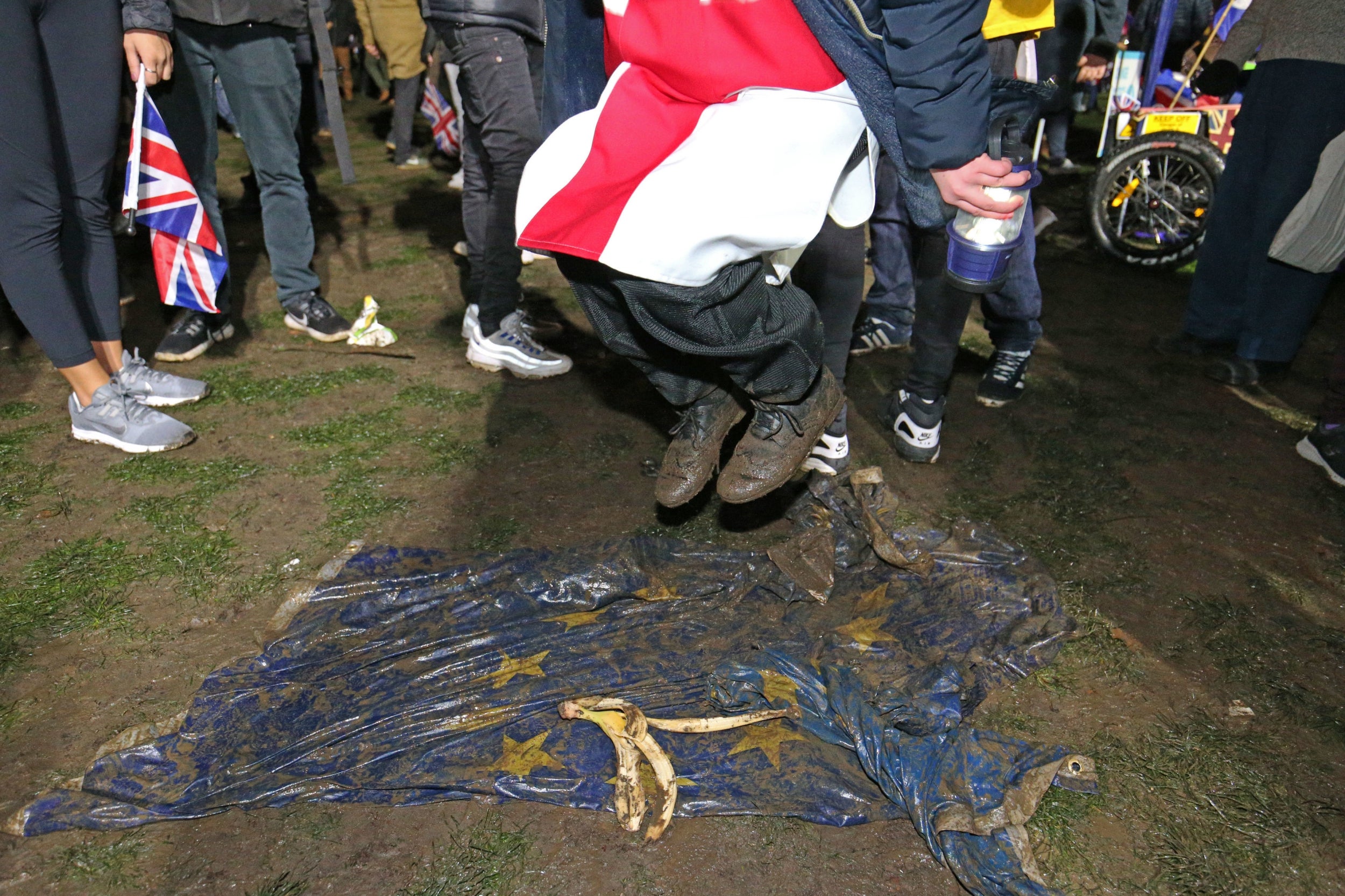
8/66
A pro-Brexit supporter jumps on an EU flag in Parliament Square
PA
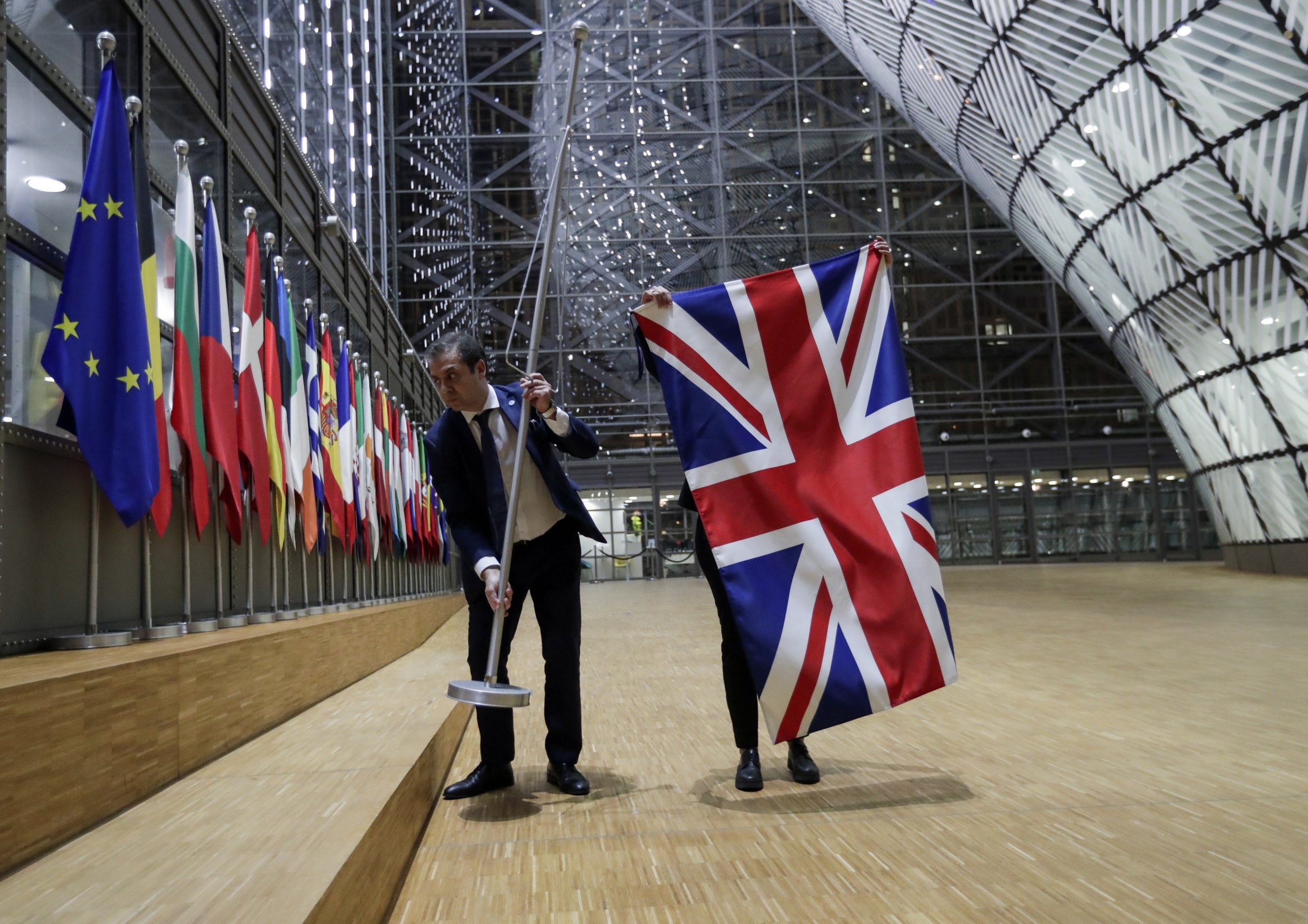
9/66
EU Council staff removed the Union Jack-British flag from the European Council in Brussels, Belgium
EPA
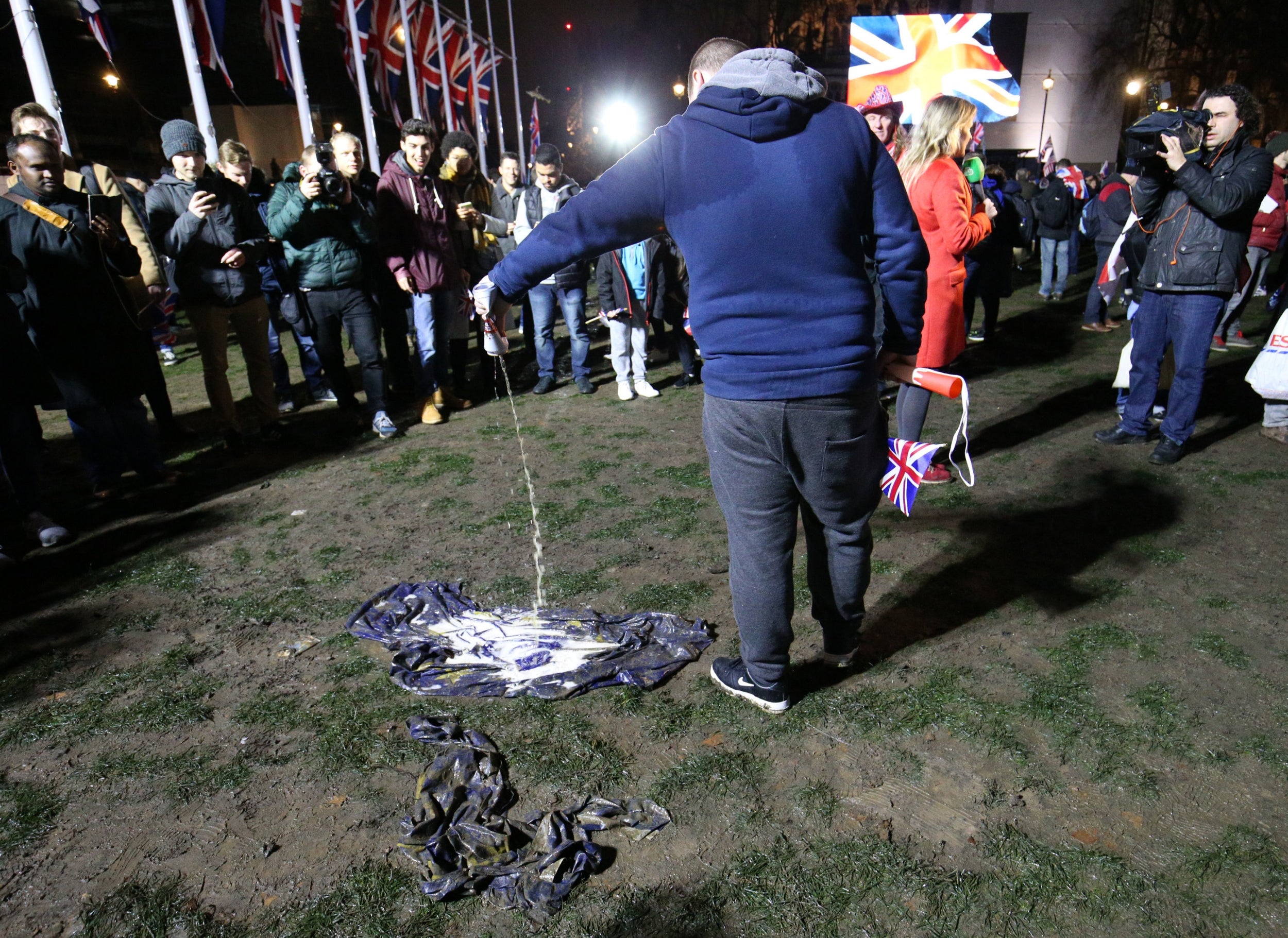
10/66
A pro-Brexit supporter pours beer onto an EU flag
PA
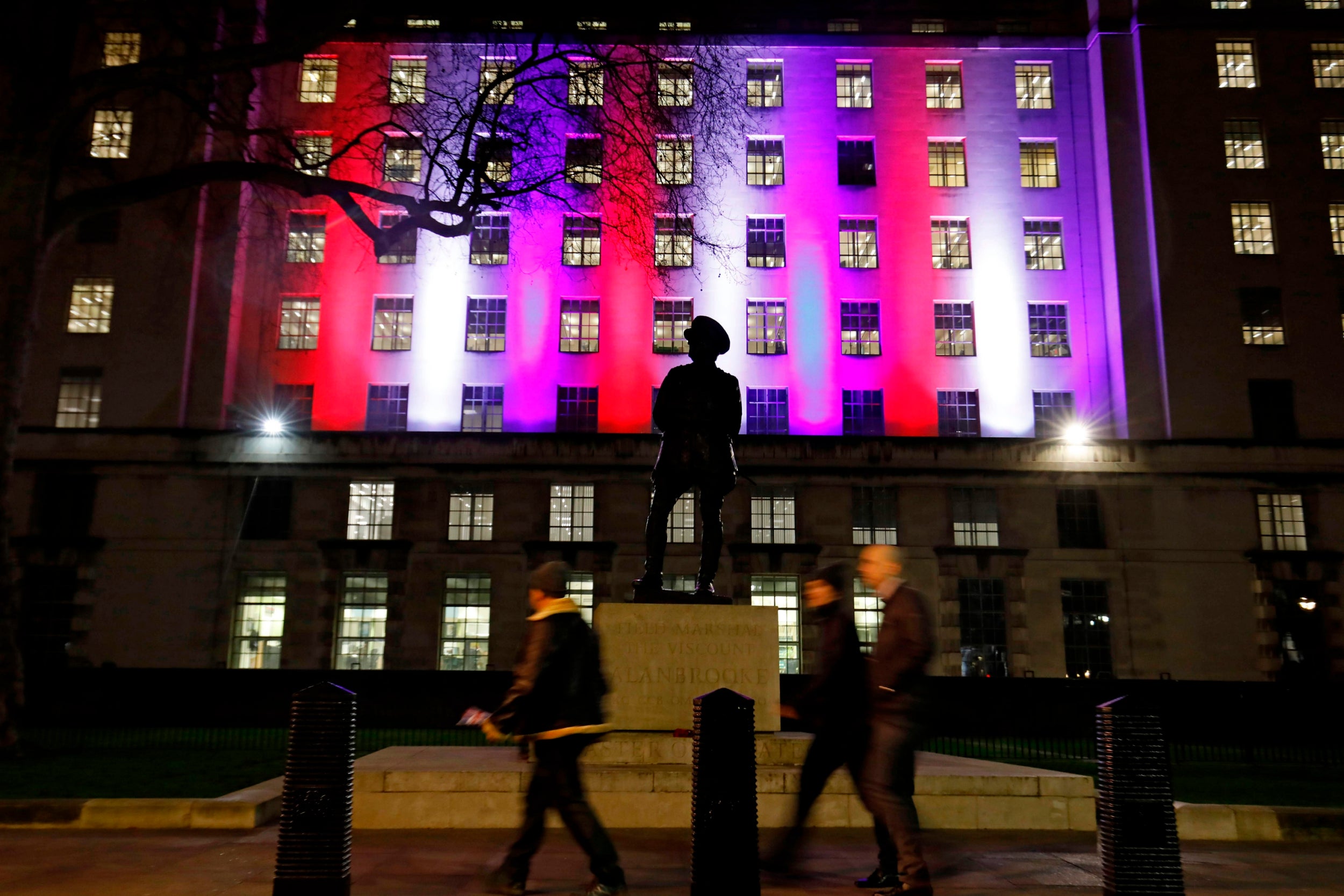
11/66
Pedestrians pass in front of the Ministry of Defence Building on Whitehall, illuminated by red, white and blue lights in central London
AFP via Getty Images
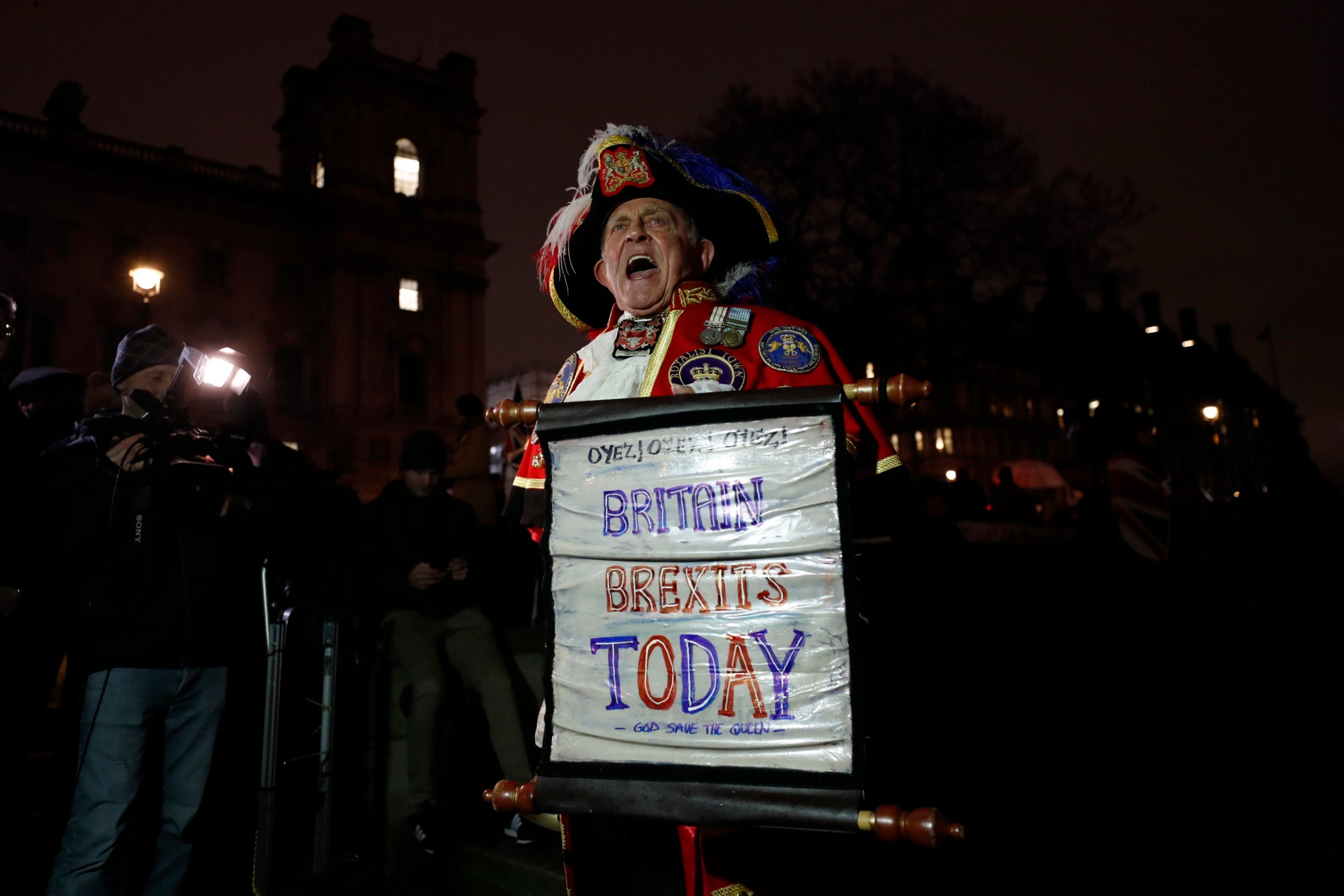
12/66
A Brexit supporter shouts during a rally in London
AP

13/66
Pro-EU campaigners outside the Scottish Parliament, Edinburgh
PA

14/66
Pro-EU campaigners take part in a ‘Missing EU Already’ rally outside the Scottish Parliament, Edinburgh
PA
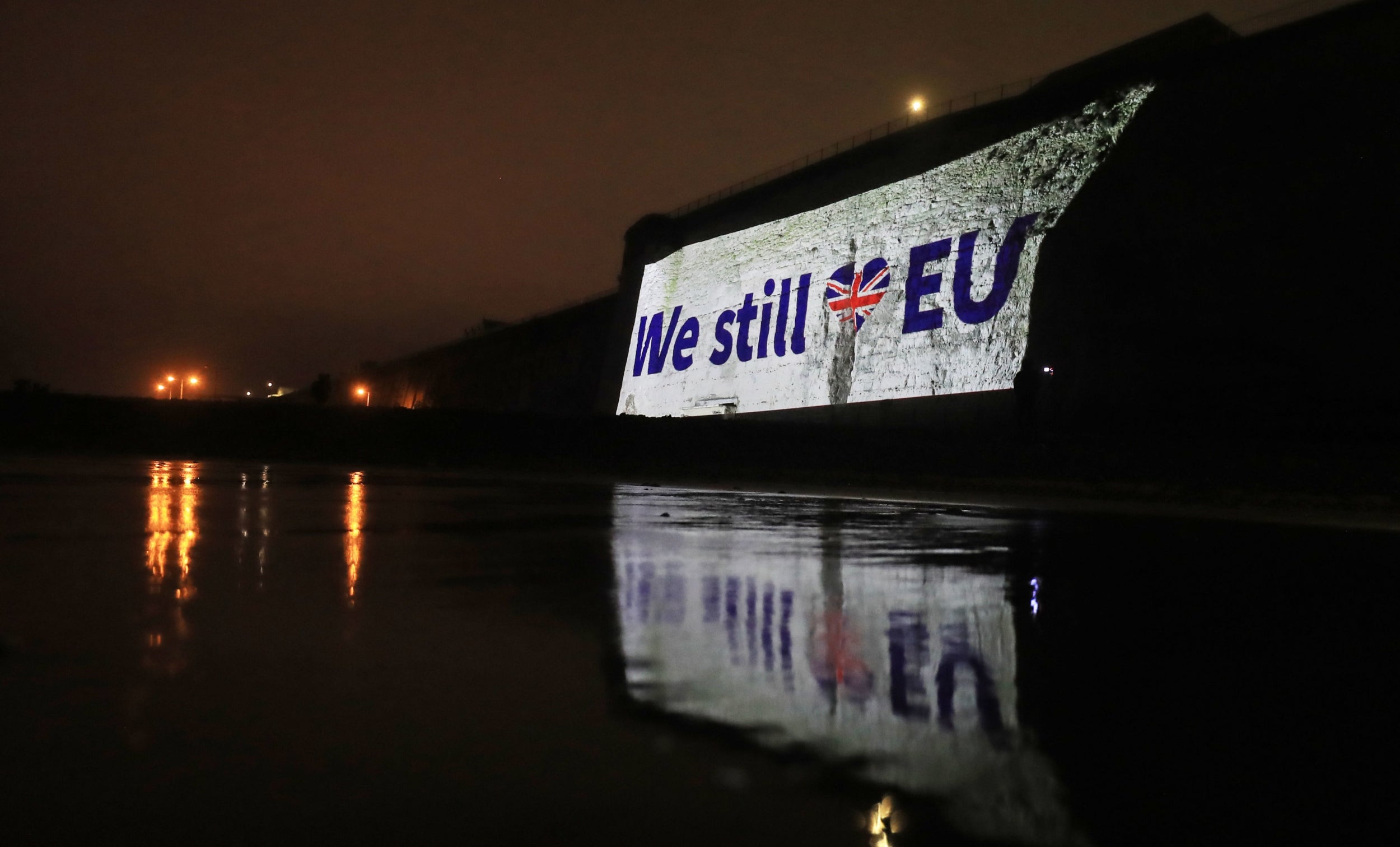
15/66
A large pro-EU banner is projected onto Ramsgate cliff in Kent
PA

16/66
Pro-EU supporters light candles in Smith Square in Westminster
PA

17/66
A man waves Union flags from a small car as he drives past Brexit supporters gathering in Parliament Square
AFP via Getty Images
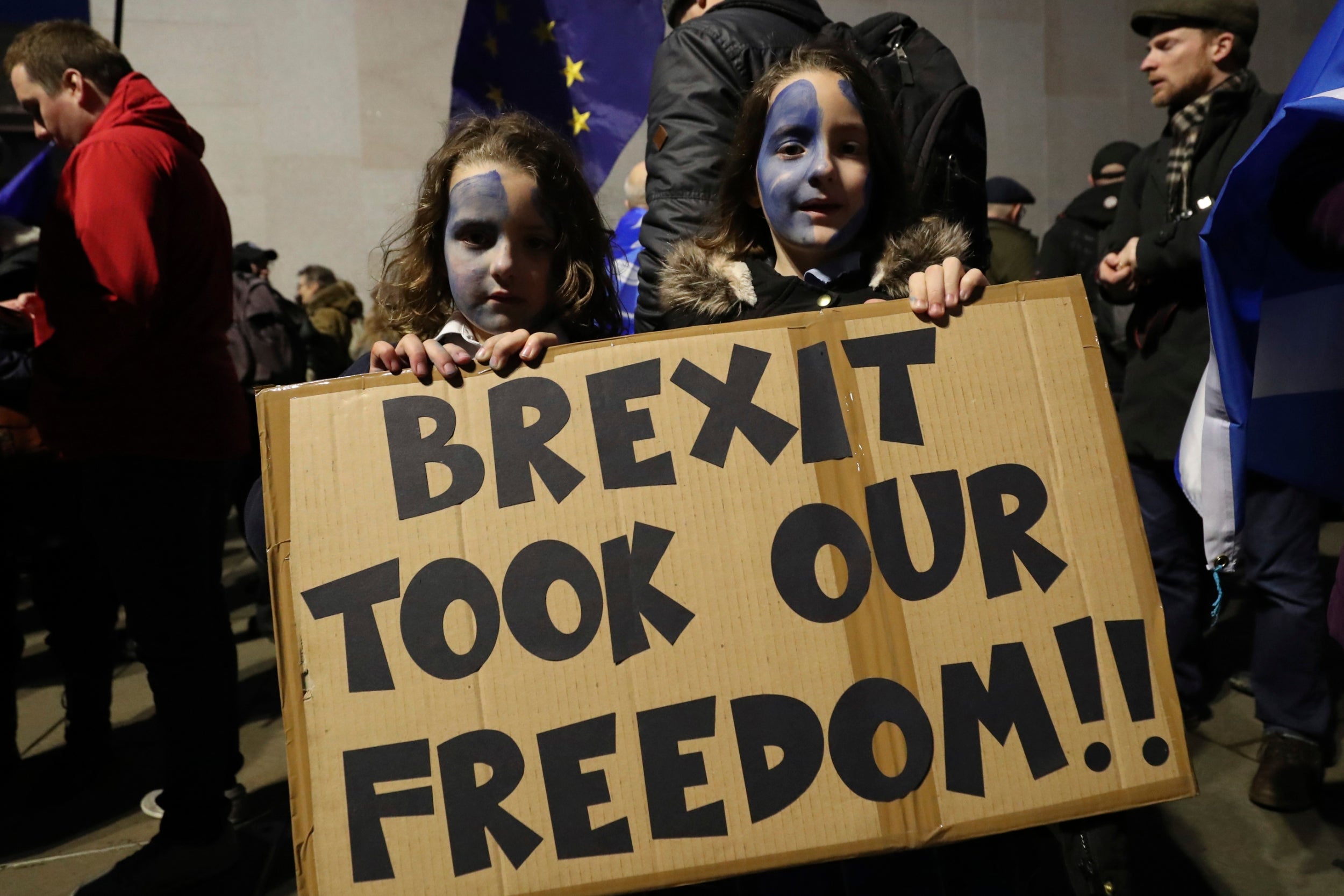
18/66
The five-year old Elisa Saemann, left, and her seven-year old sister Katie hold a placard during a rally by anti-Brexit protesters outside the Scottish parliament in Edinburgh
AP
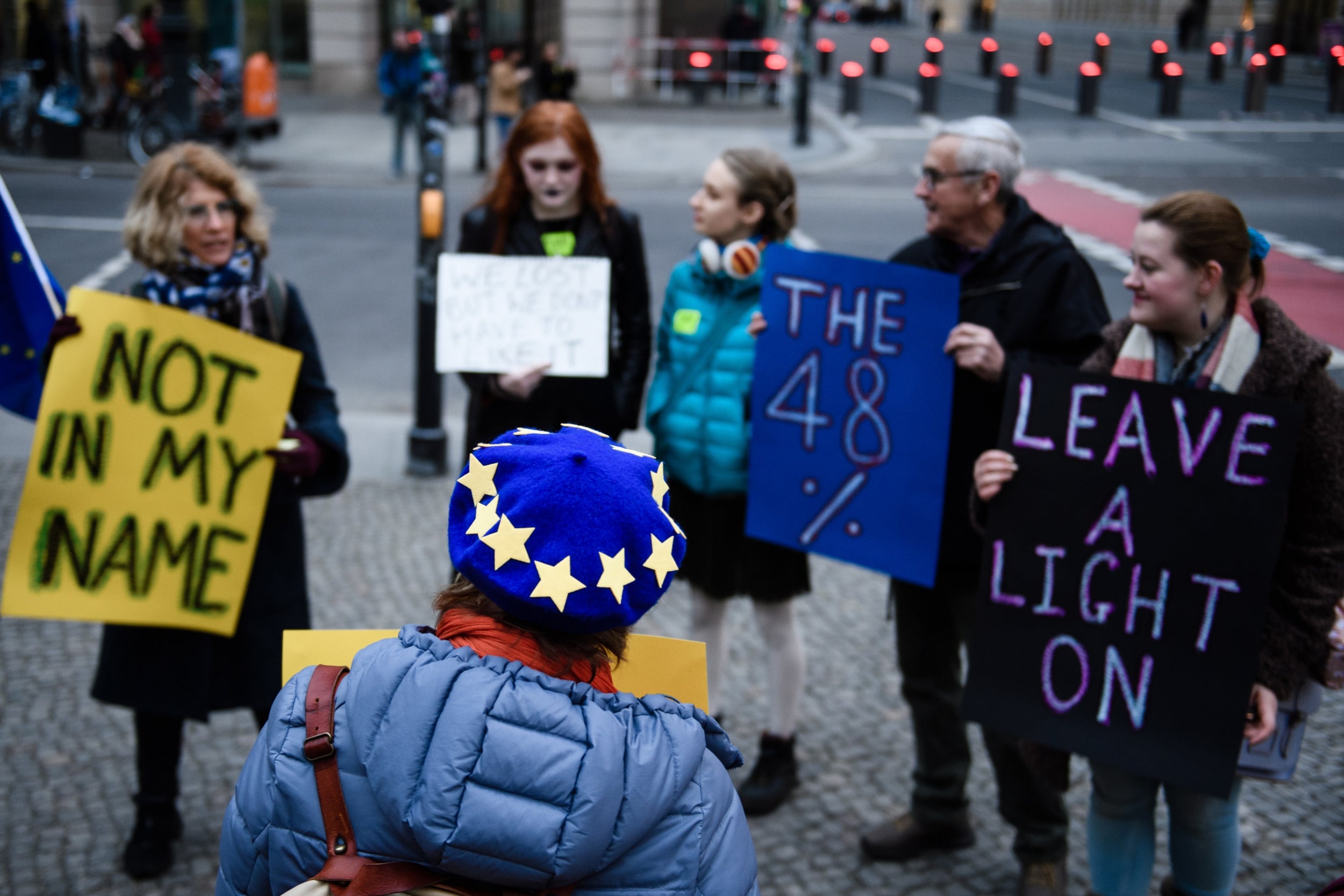
19/66
Pro Europe supporters gather on Brexit day near the British embassy in Berlin, Germany
EPA

20/66
Anti-Brexit protester hugs a man while holding a placard
REUTERS
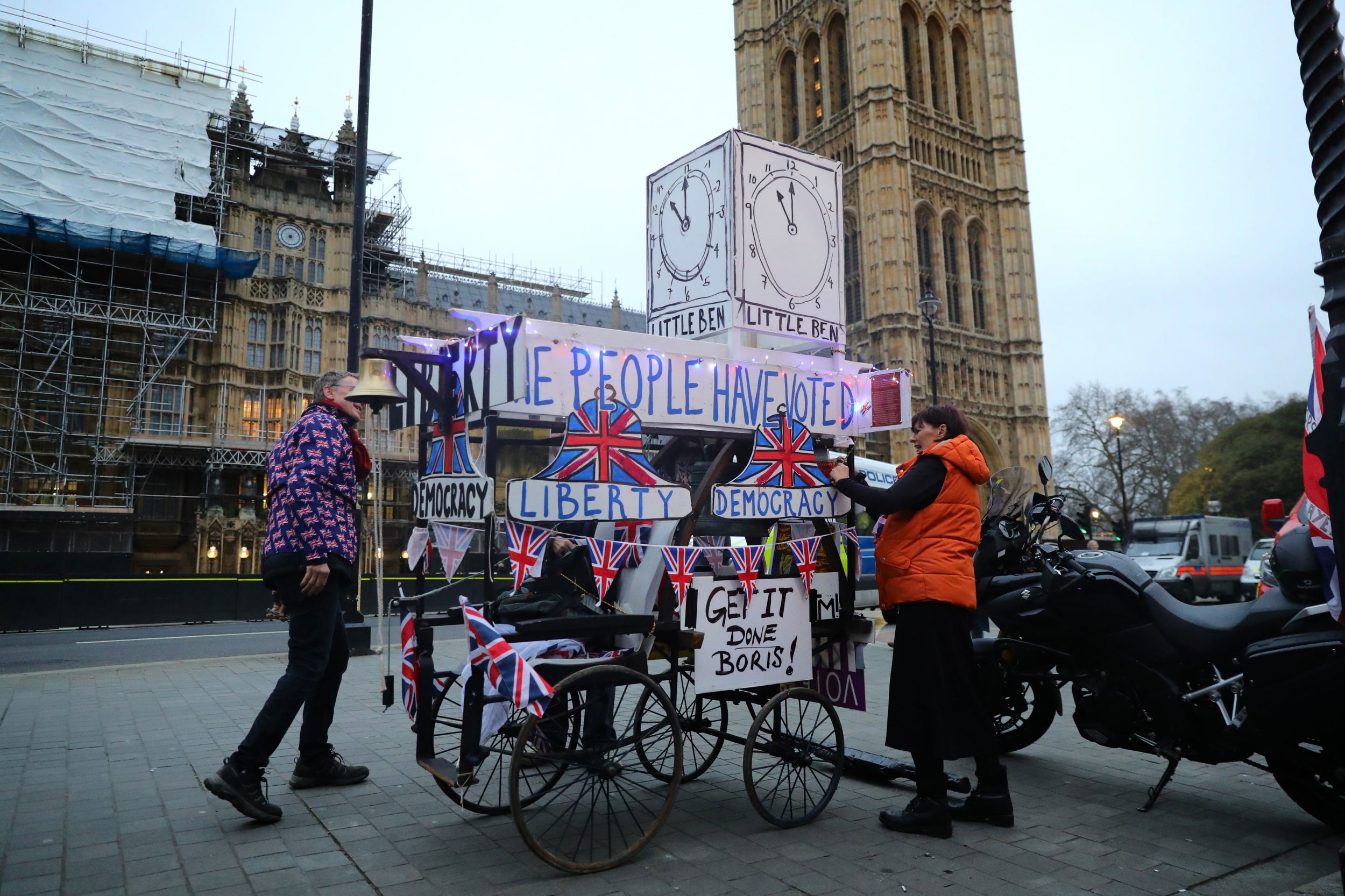
21/66
A decorated, old fashioned fire pump in Parliament Square
PA
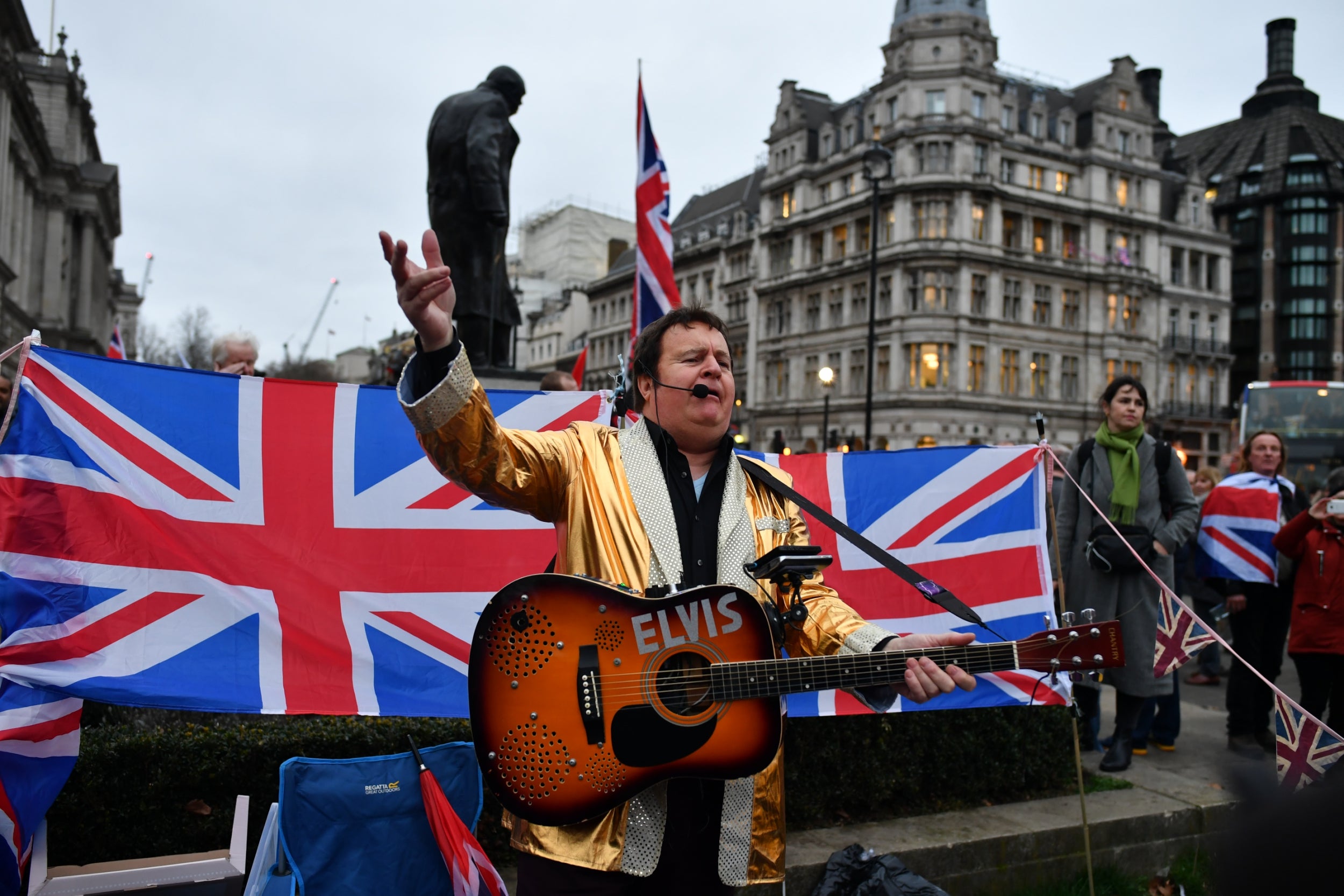
22/66
Pro Brexit Elvis impersonator performs at Parliament Square
Getty Images
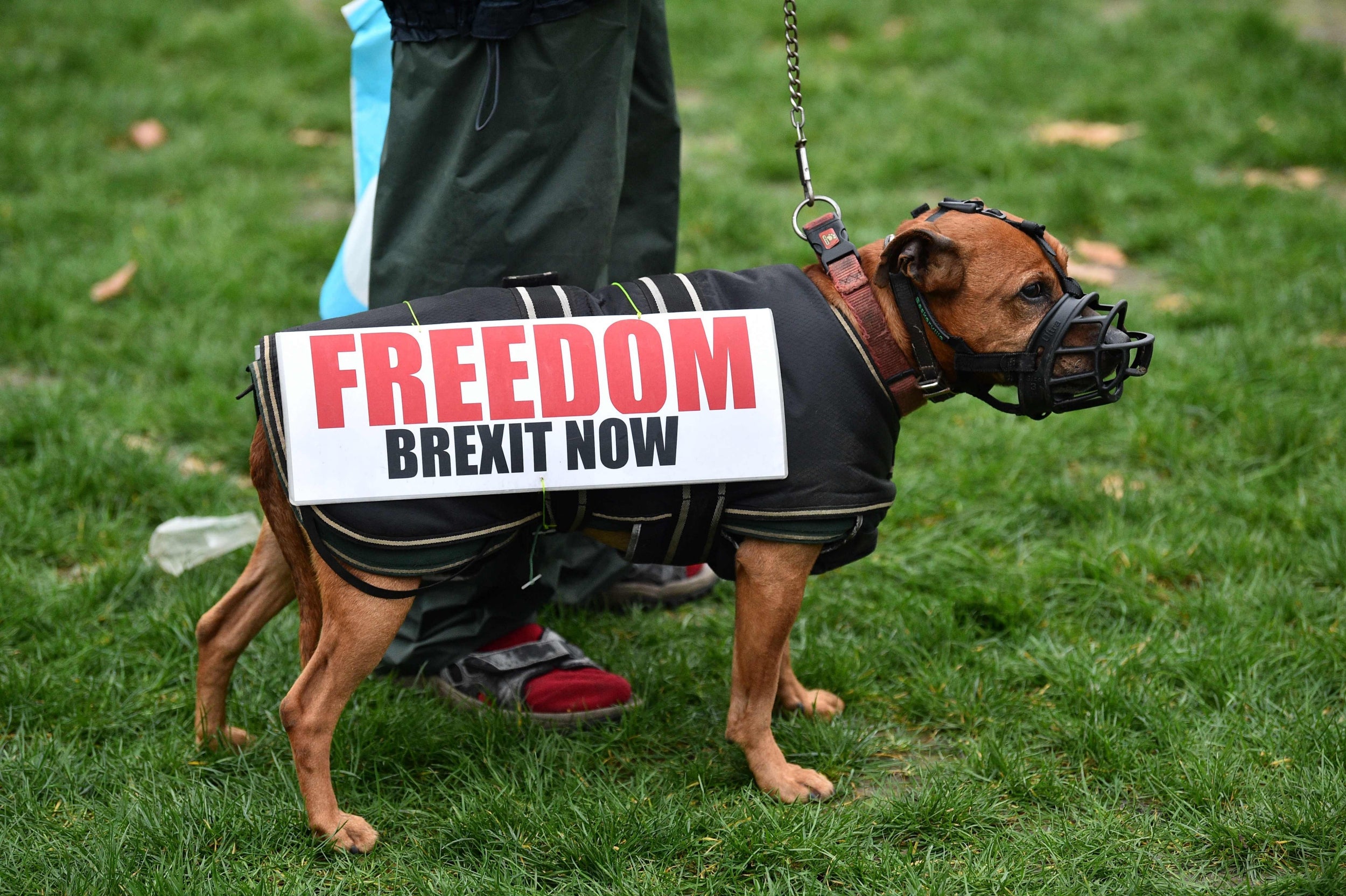
23/66
An anti-Brexiteers stands with his dog in Parliament Square
AFP via Getty Images
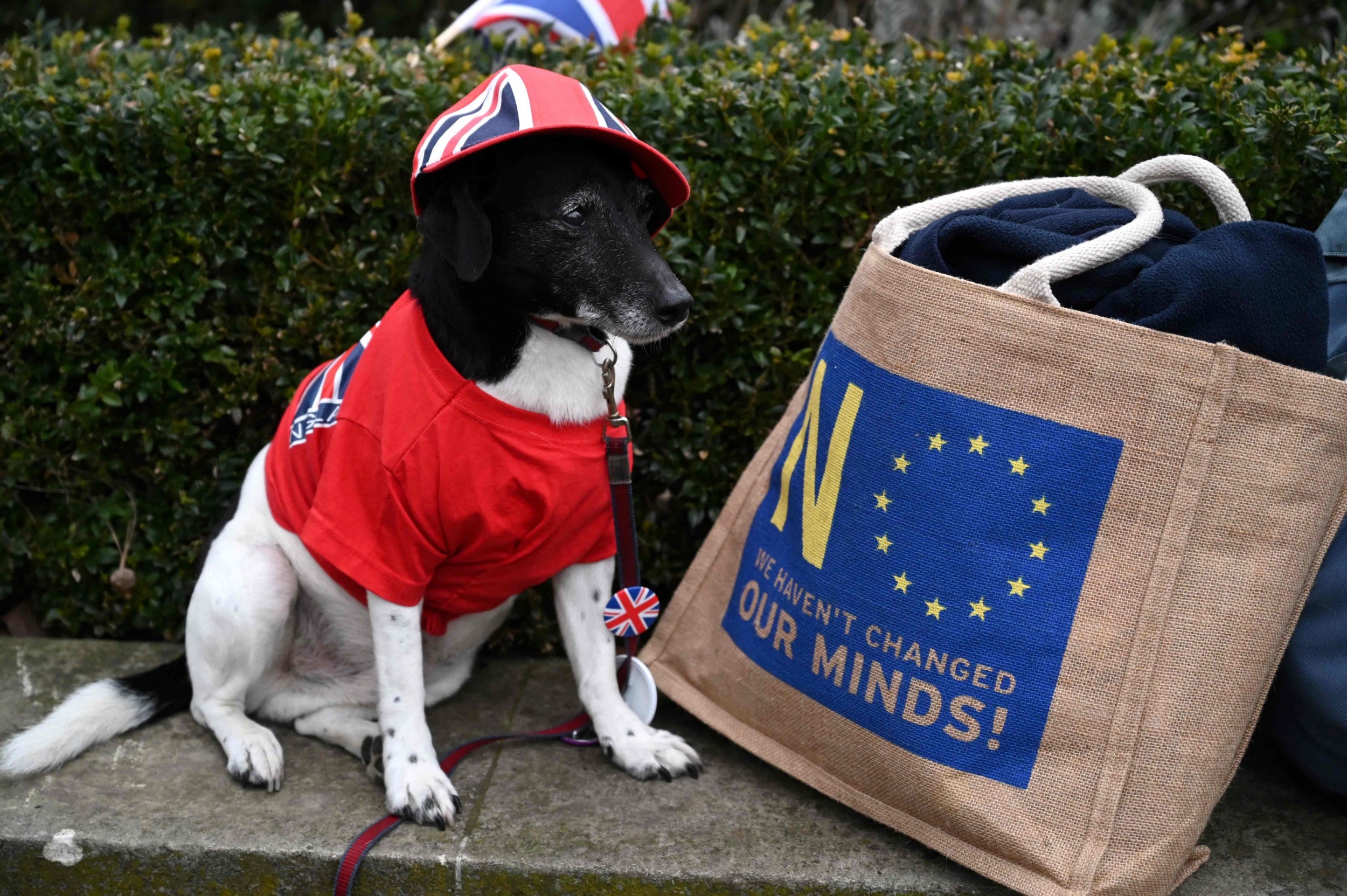
24/66
Paddy from Bournemouth wears Union colours as he sits next to an EU flag decorated bag in Parliament Square
AFP via Getty Images
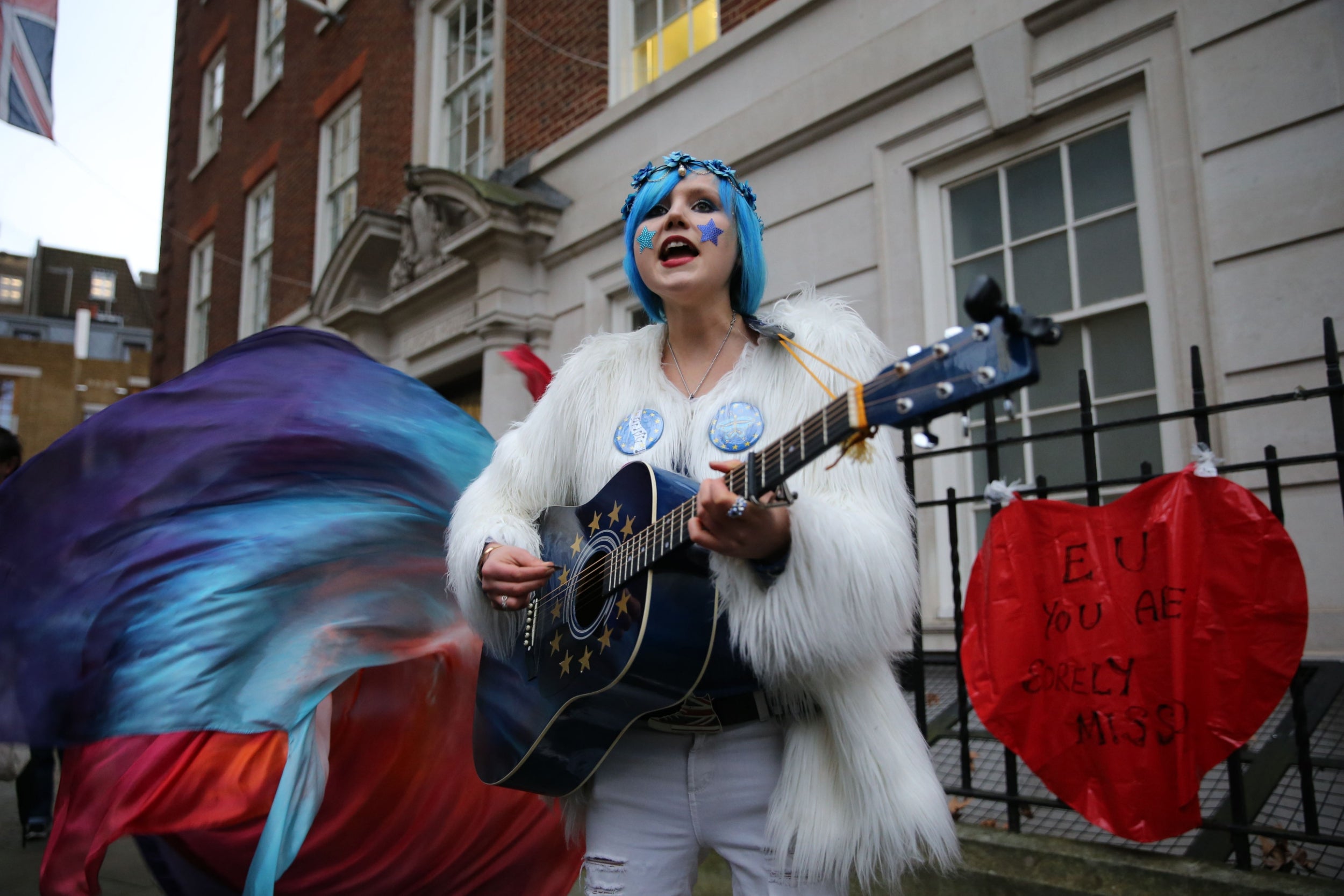
25/66
A pro-EU activist plays a guitar decorated with the EU flag during a protest organised by civil rights group New Europeans outside Europe House, central London
AFP via Getty Images
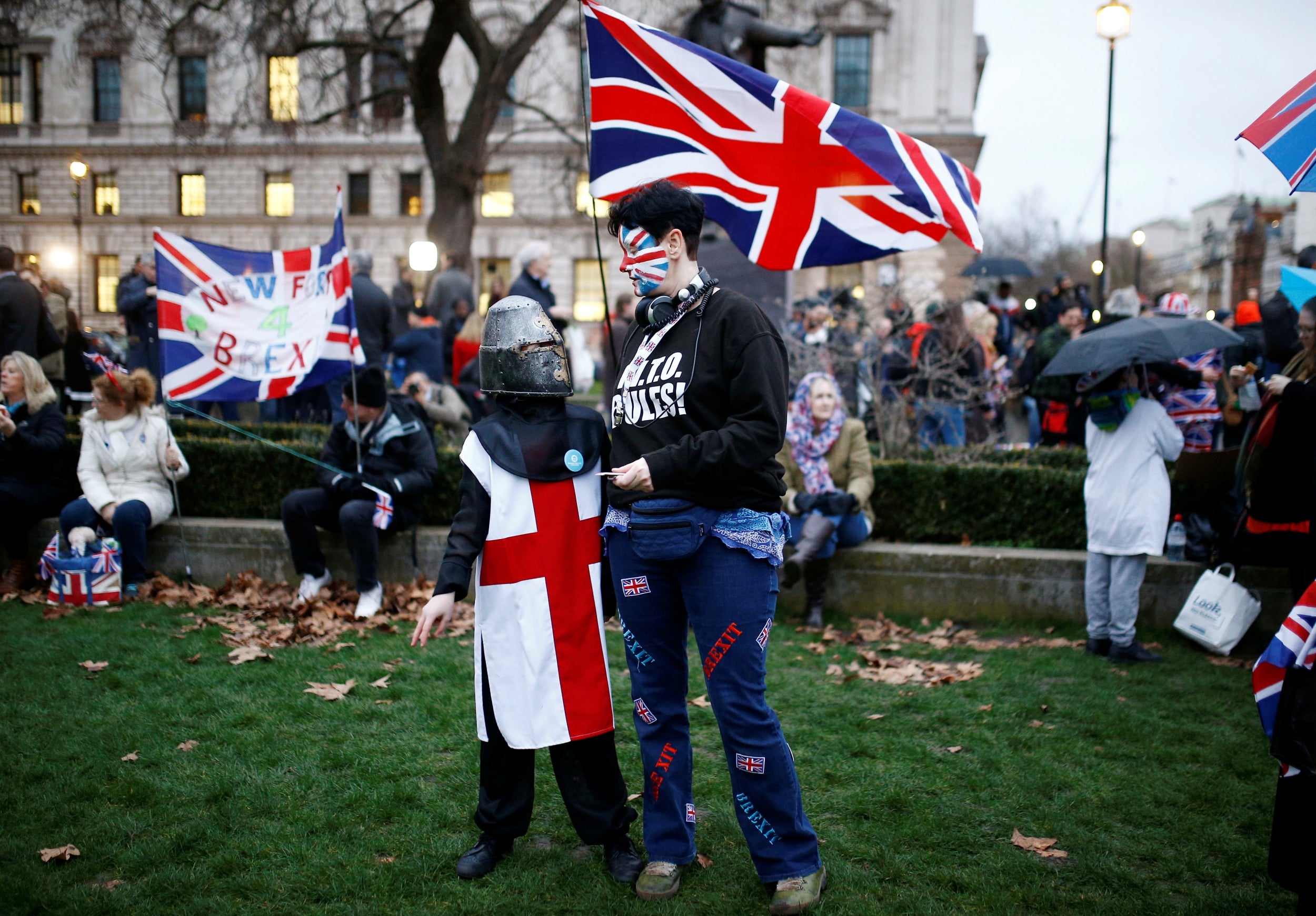
26/66
People celebrate Britain leaving the EU
REUTERS
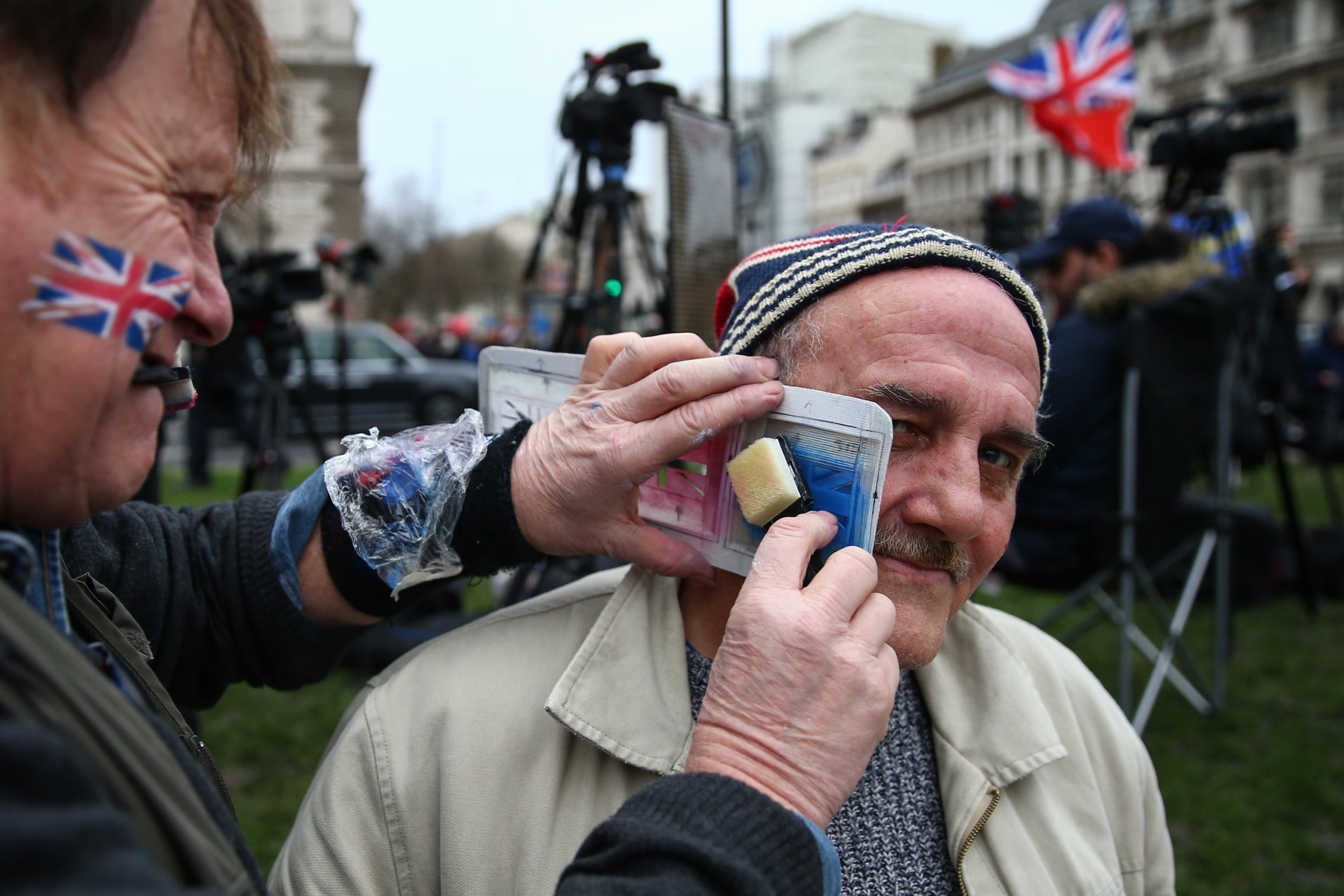
27/66
A Pro Brexit supporter has a Union Jack painted onto his face at Parliament Square
Getty Images
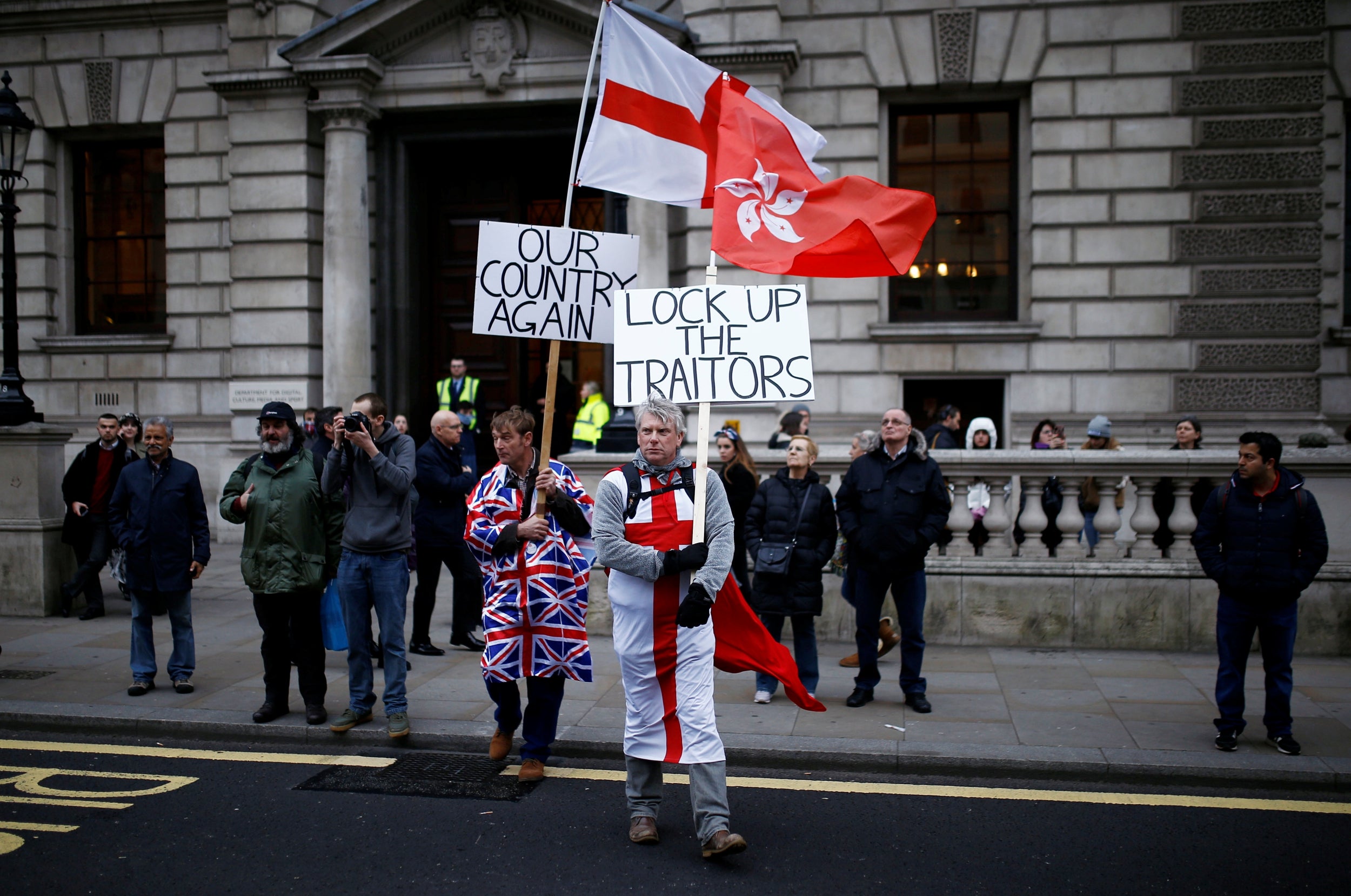
28/66
Men hold placards celebrating Britain leaving the EU
REUTERS
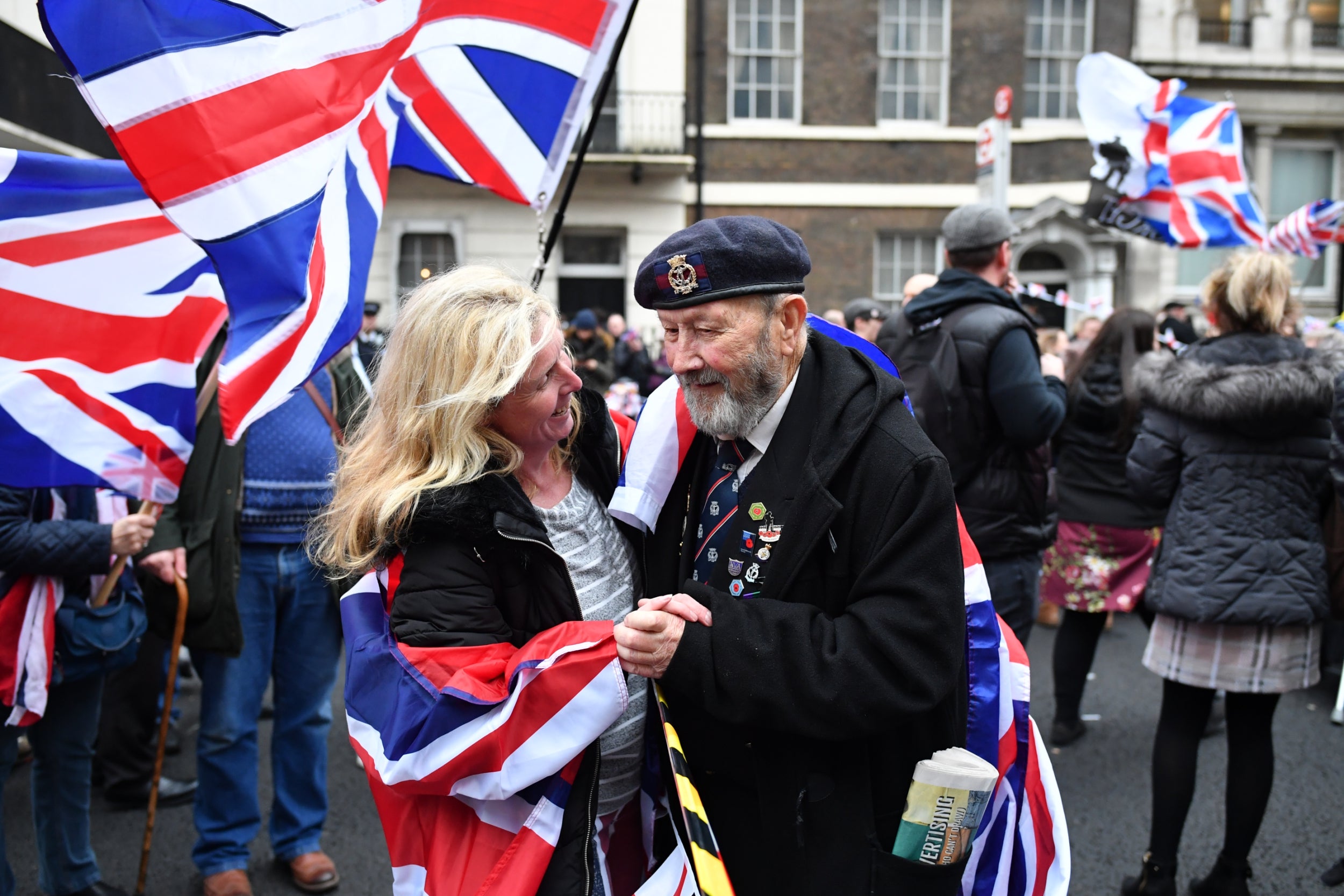
29/66
Pro Brexit supporters dance in the street draped with Union Jack flags at Parliament Square
Getty Images
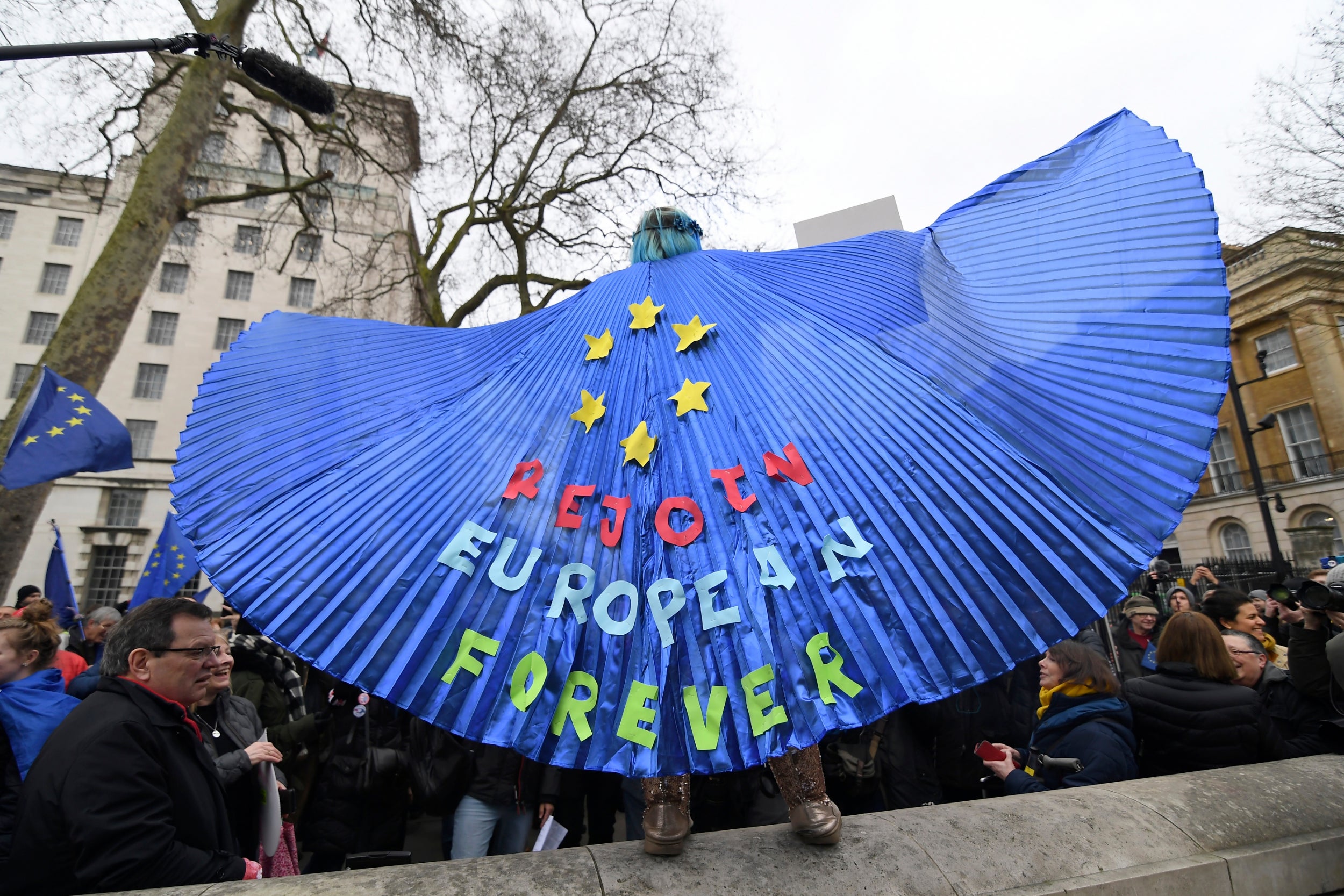
30/66
An anti-Brexit demonstrator spreads his wings during a gathering near Downing Street
AP

31/66
Pro EU supporters display a banner ‘ Here to Stay, Here to Fight, Migrants In, Tories Out’ from Westminster bridge
EPA
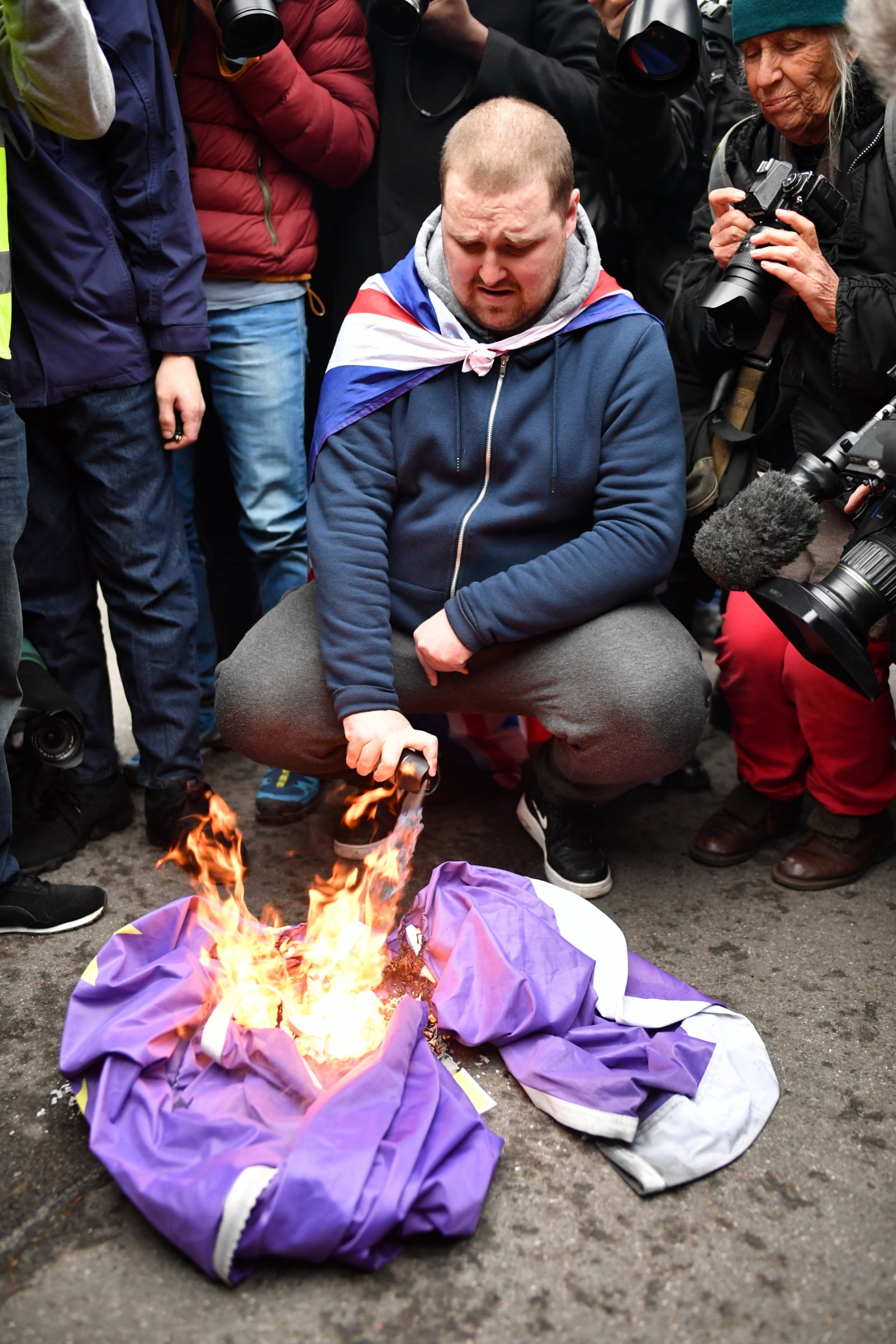
32/66
Pro-Brexit supporters burn European Union flags at Parliament Square
Getty
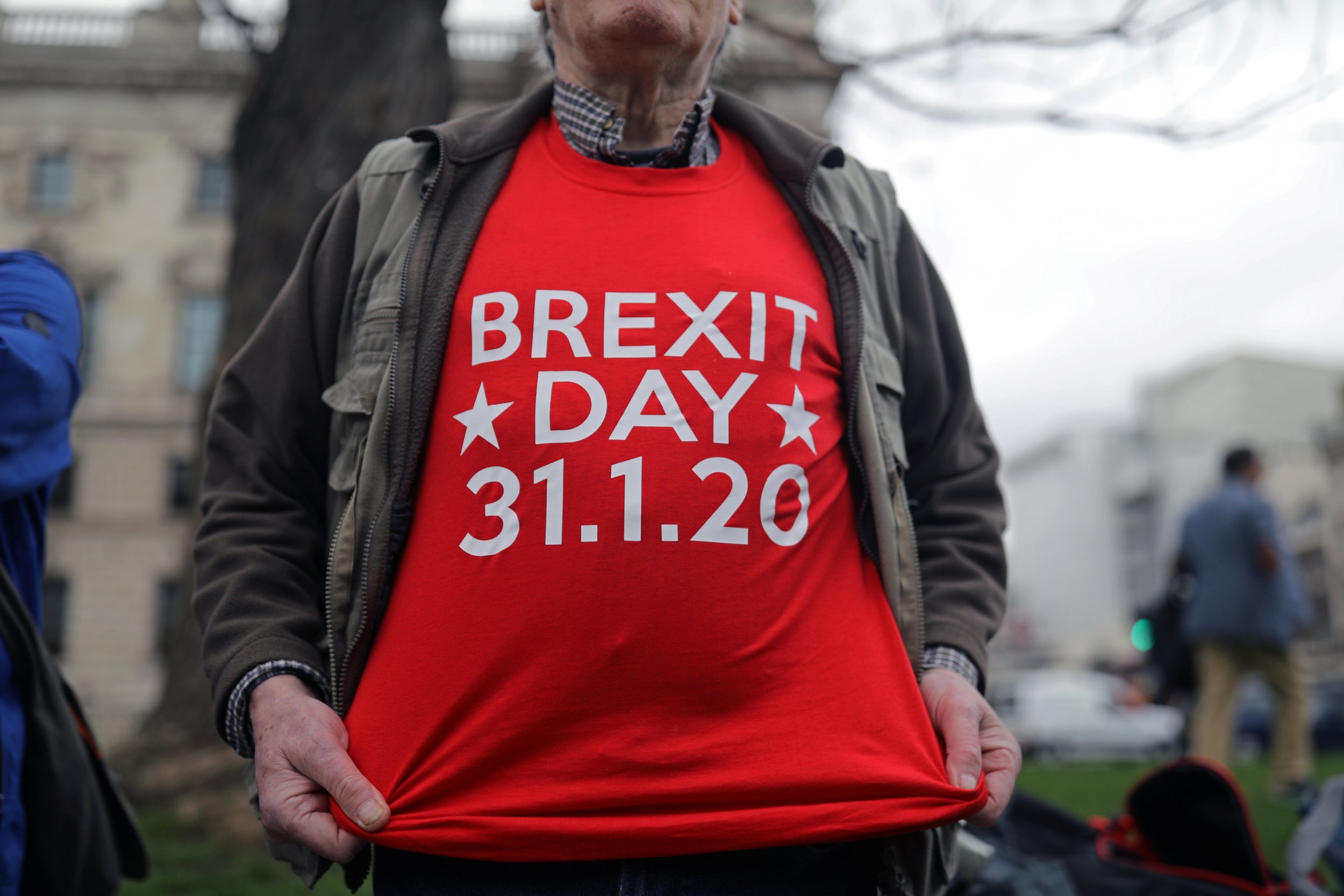
33/66
A man poses for a picture on Parliament Square in a ‘Brexit Day’ t-shirt
Reuters
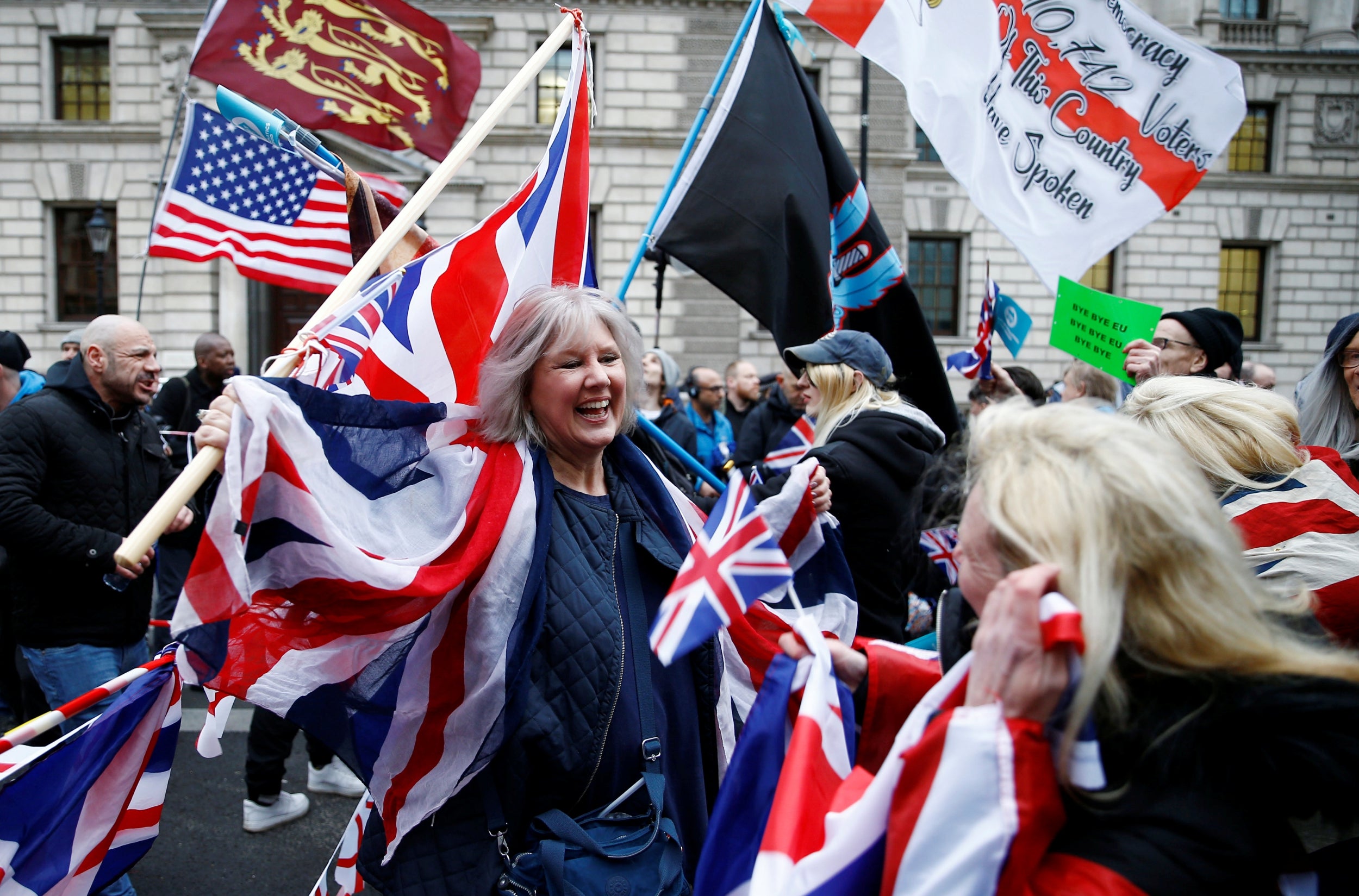
34/66
People celebrate Britain leaving the EU
Reuters
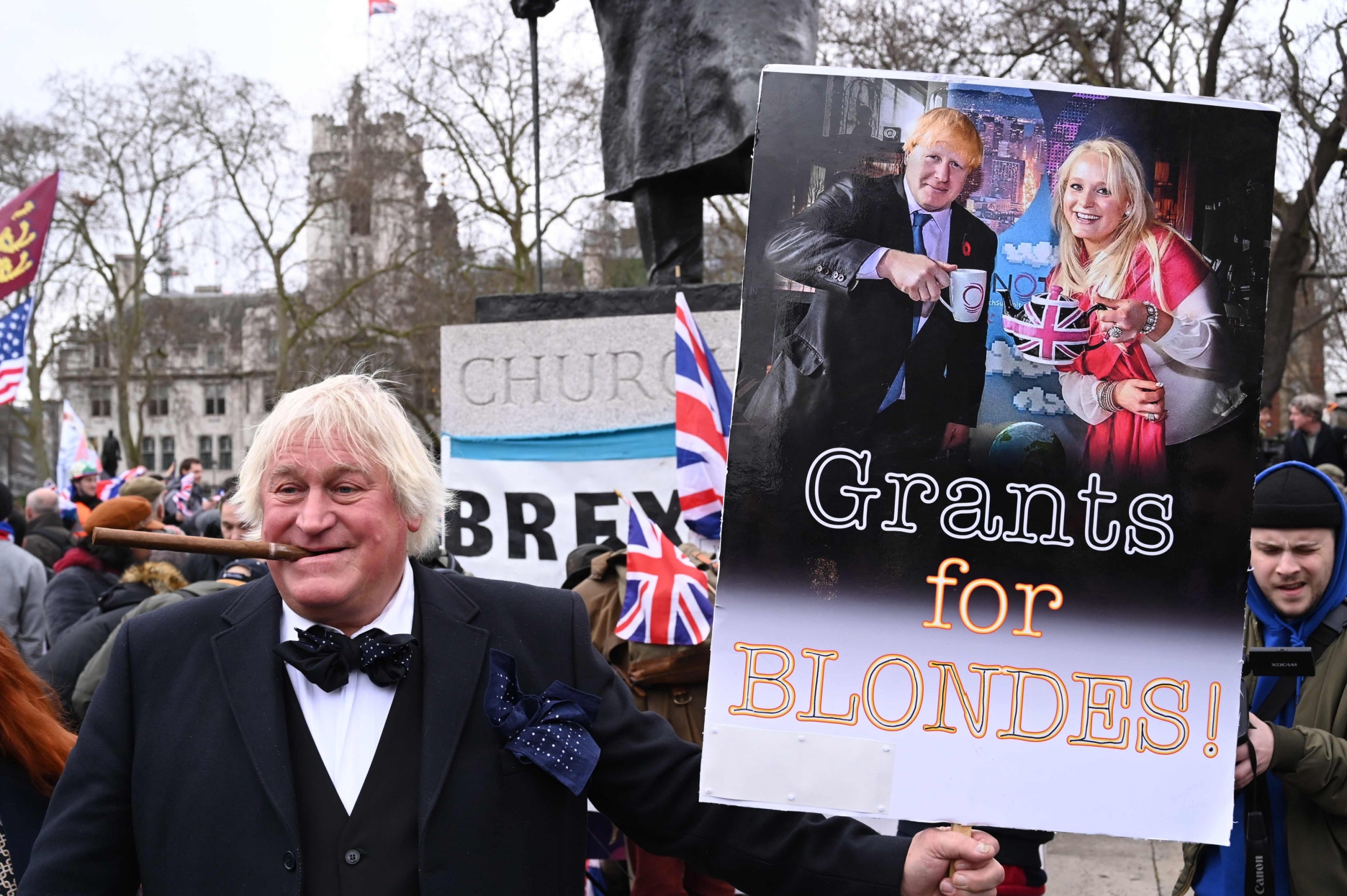
35/66
AFP via Getty
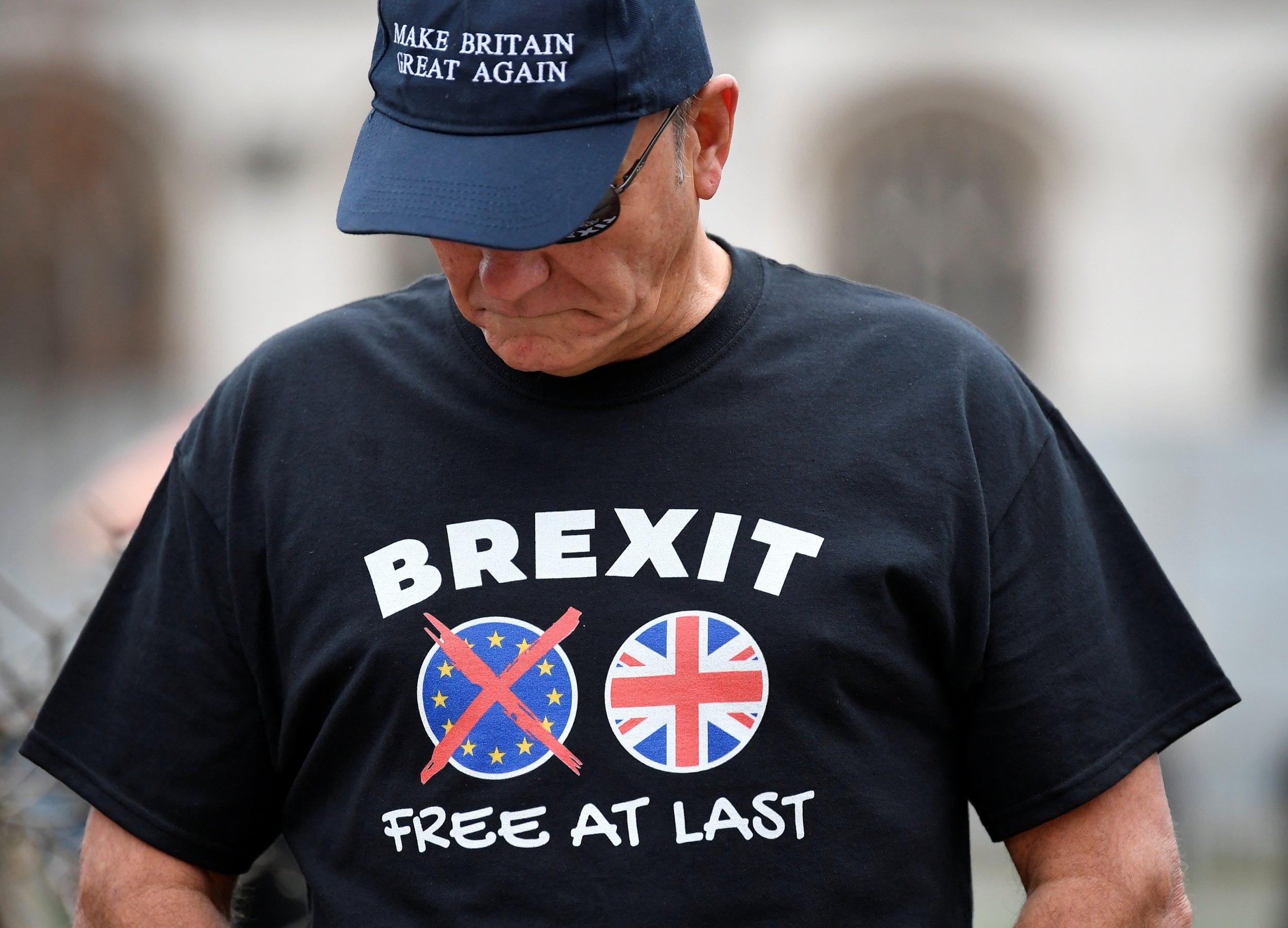
36/66
A man wears a pro-Brexit t-shirt
Reuters
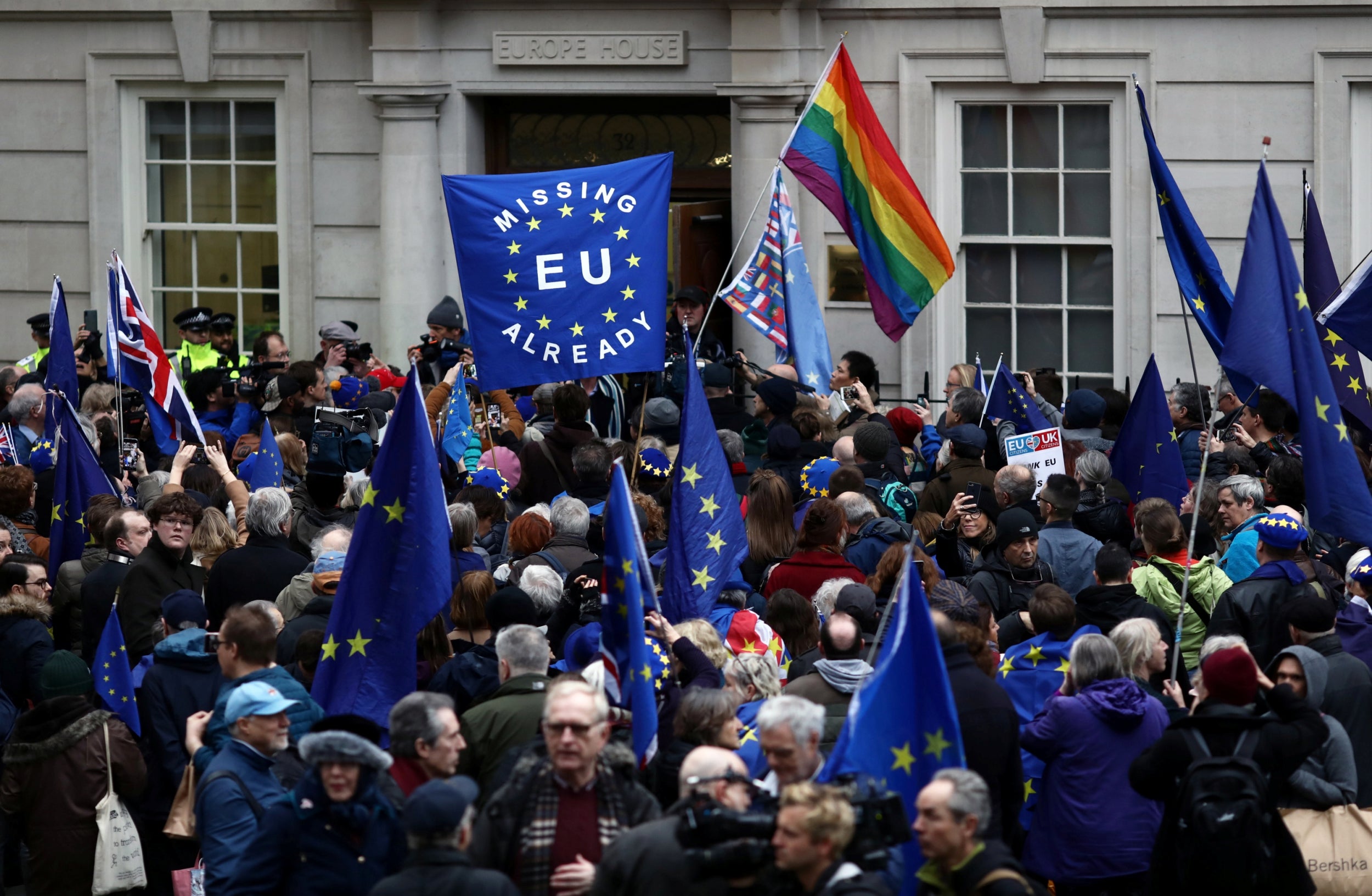
37/66
Anti-Brexit demonstrators visit Europe House to give flowers to the staff on Brexit day
Reuters
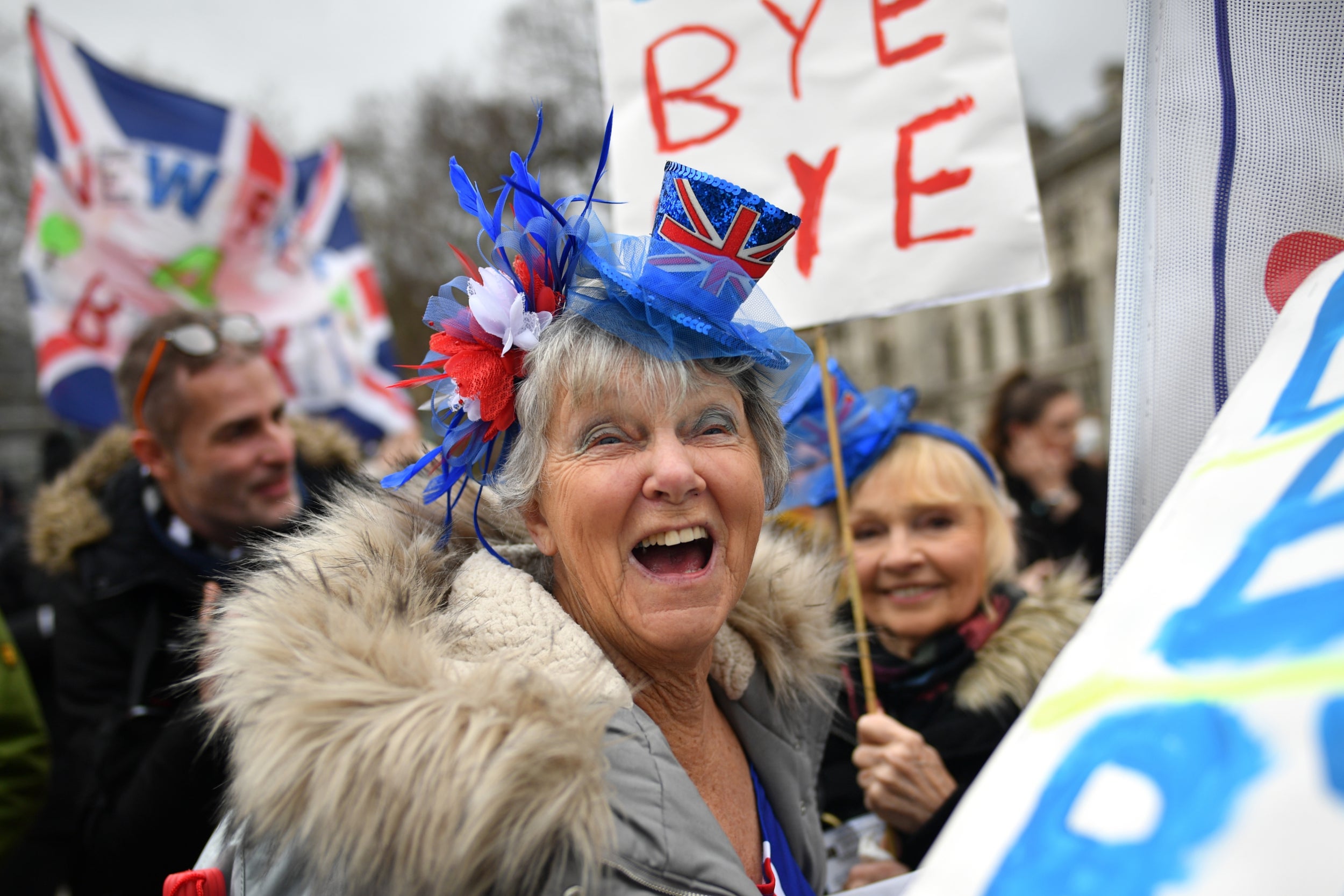
38/66
Pro Brexit supporter wears a novelty Union Jack top hat outside the Houses of Parliament
Getty Images

39/66
Customers Scott Jones and Laura Jones at the Sawmill Bar in South Elmsall, Yorkshire, where a Brexit party is being held throughout the day
PA
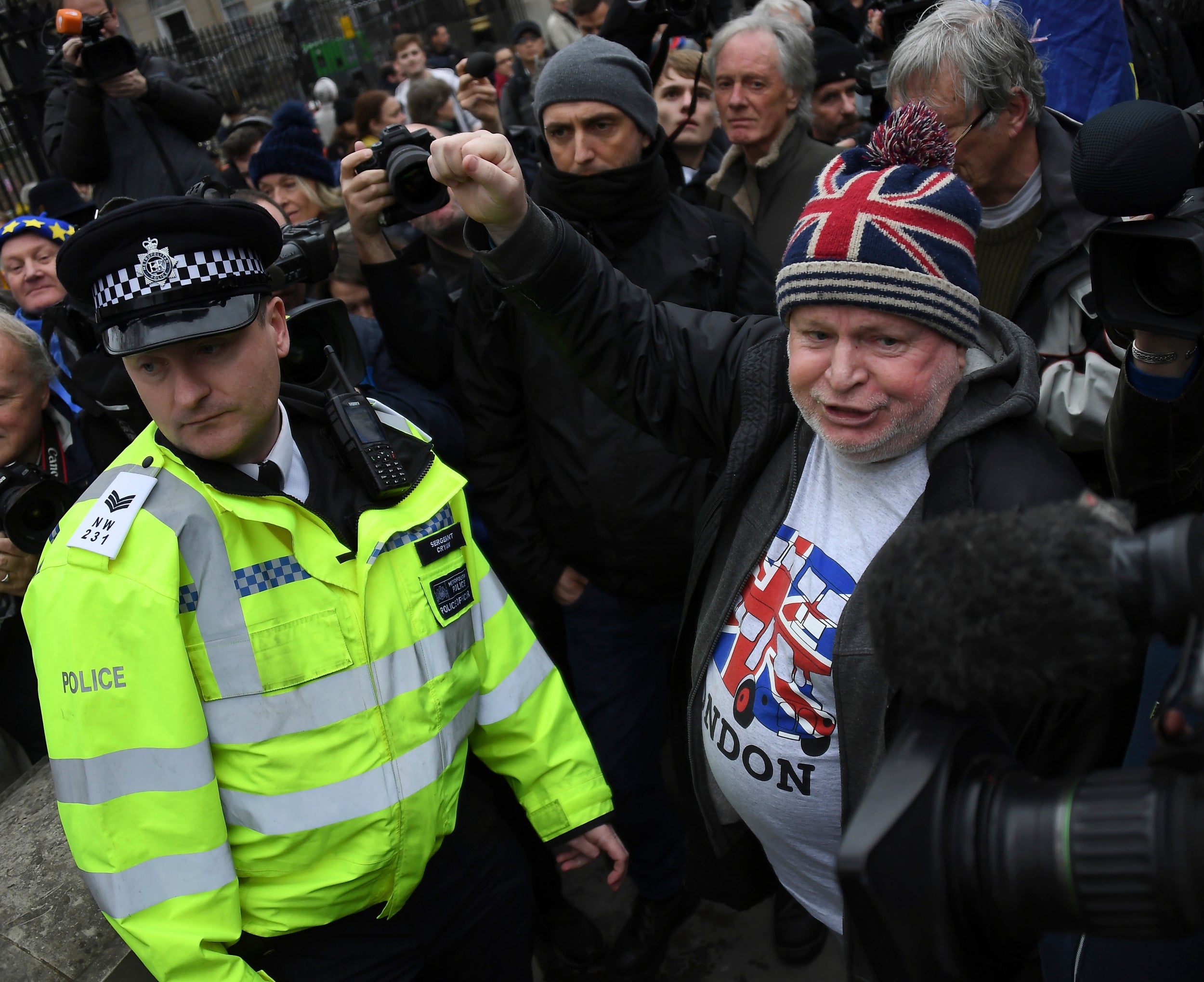
40/66
AP
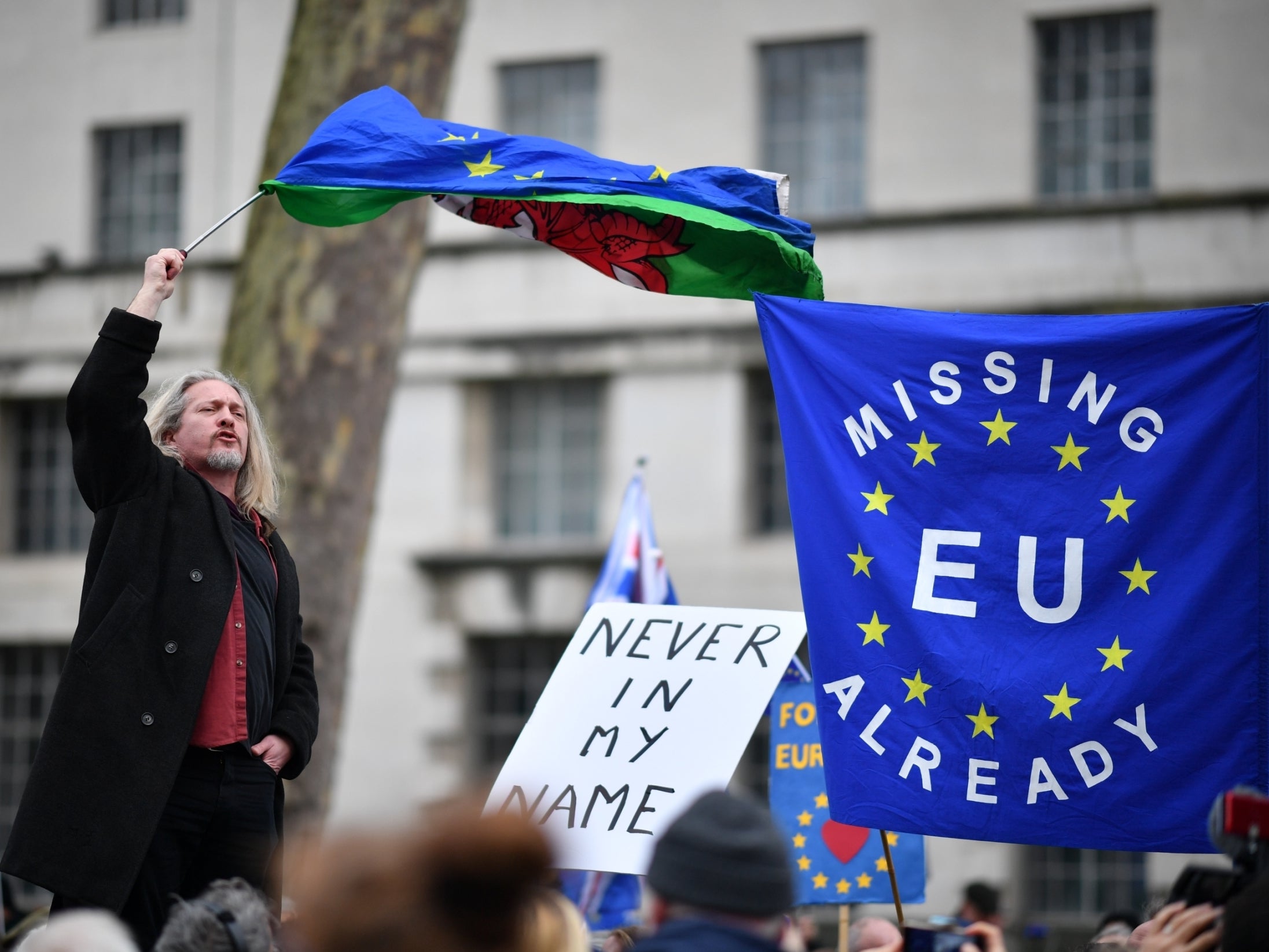
41/66
Getty

42/66
Getty Images
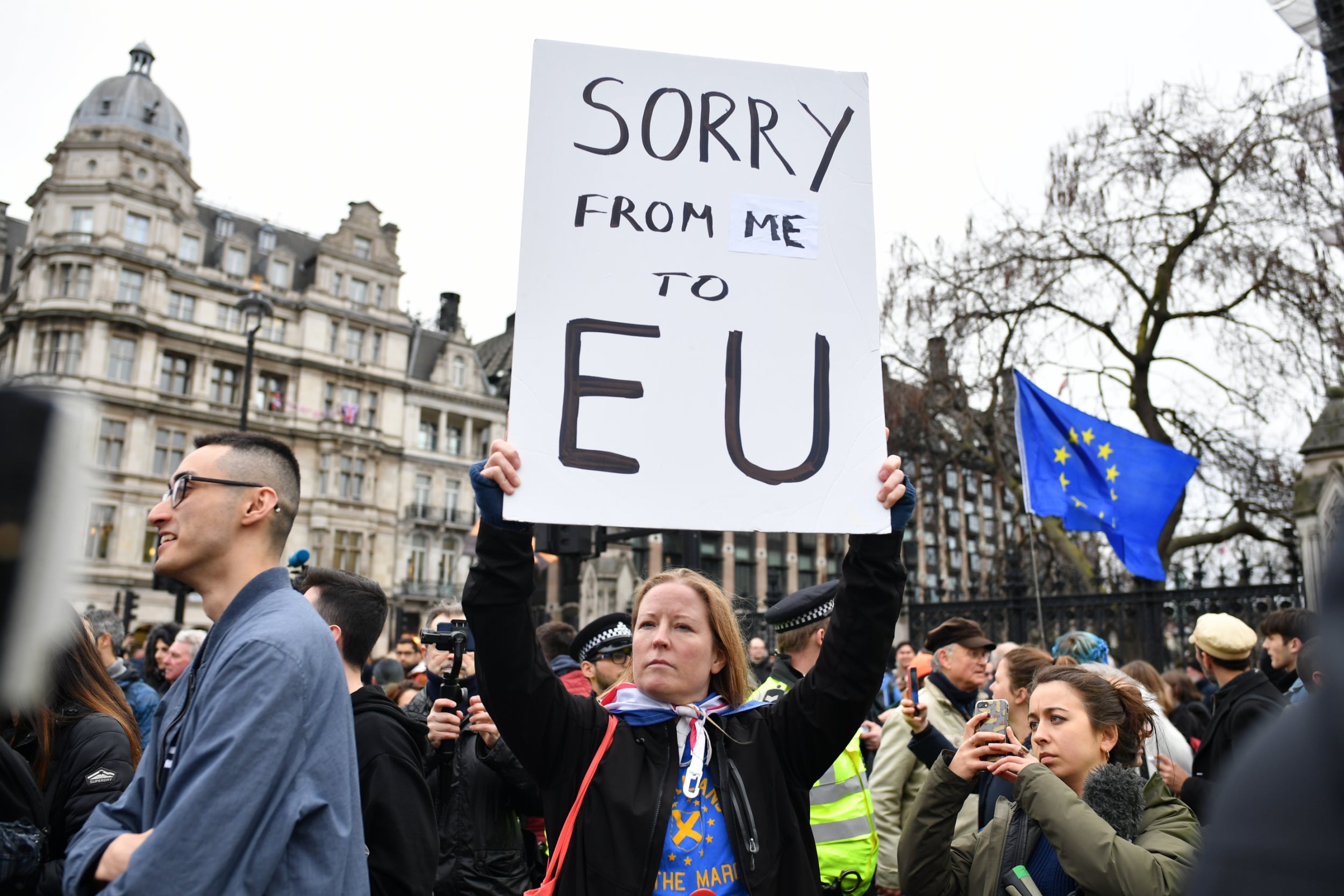
43/66
Pro-EU activists protest
Getty Images
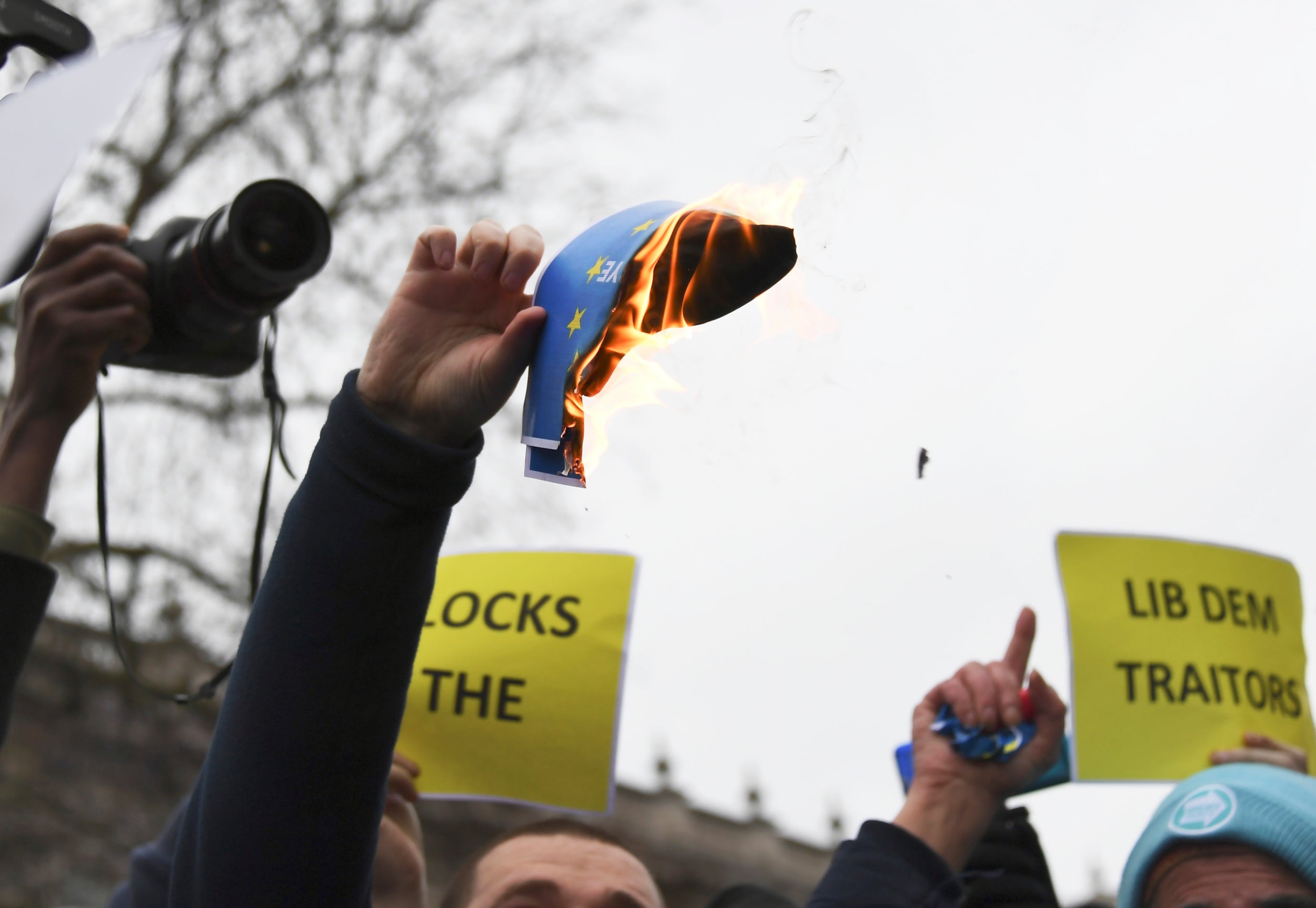
44/66
A pro-Brexit demonstrator burns a European Union flag
AP
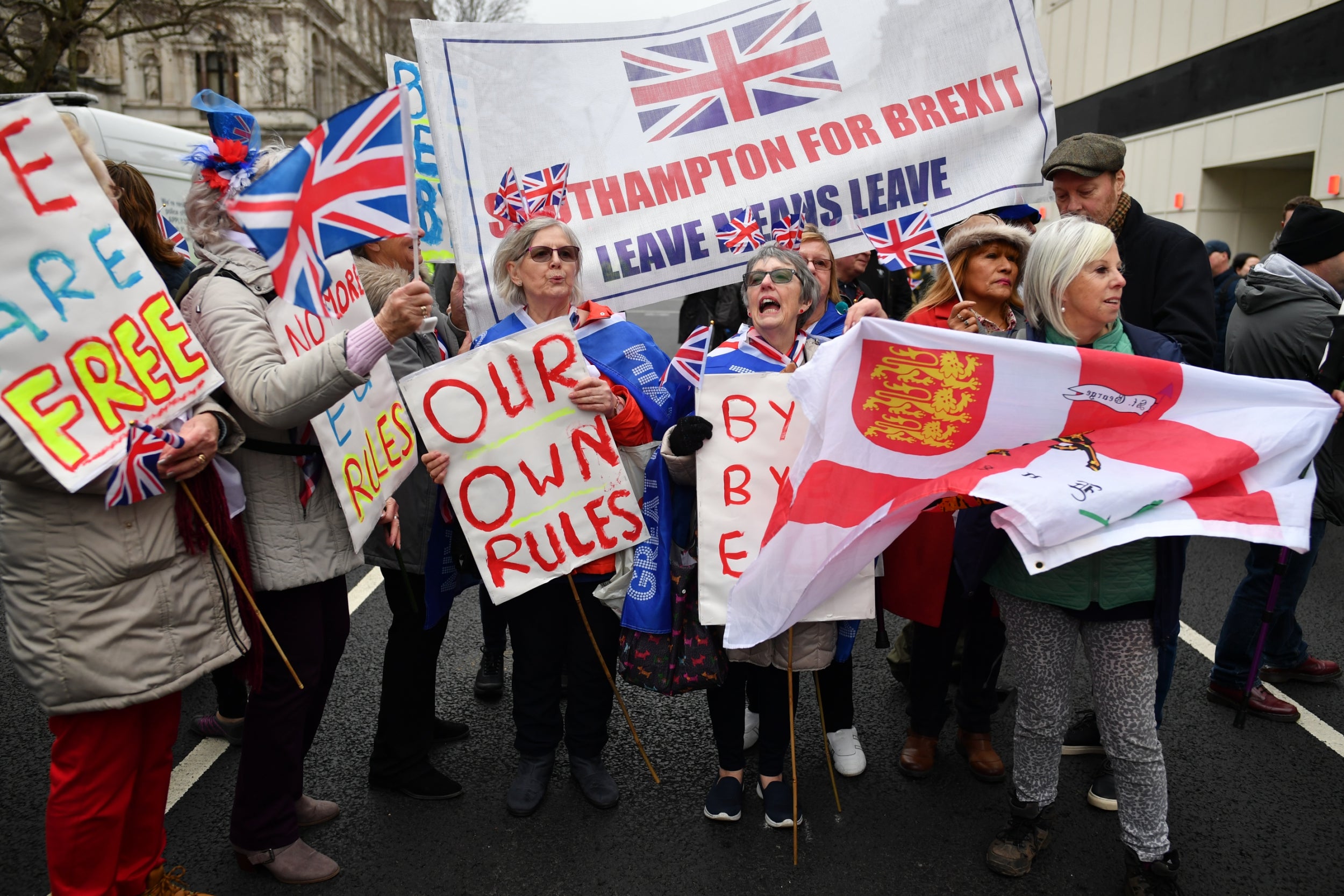
45/66
Pro Brexit supporters
Getty Images
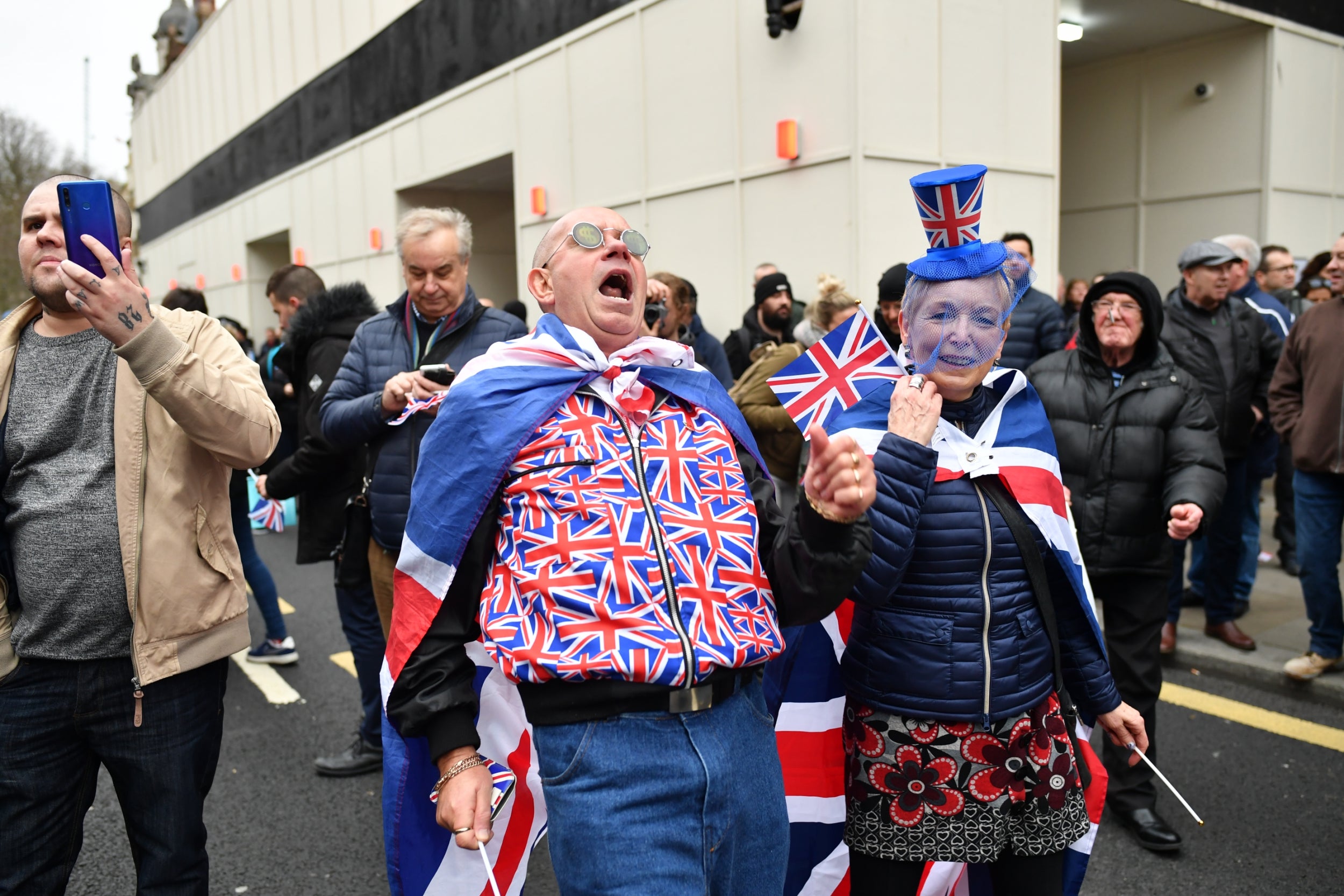
46/66
Pro Brexit supporters
Getty Images

47/66
A Brexit supports holds a sign in Parliament Square
AP
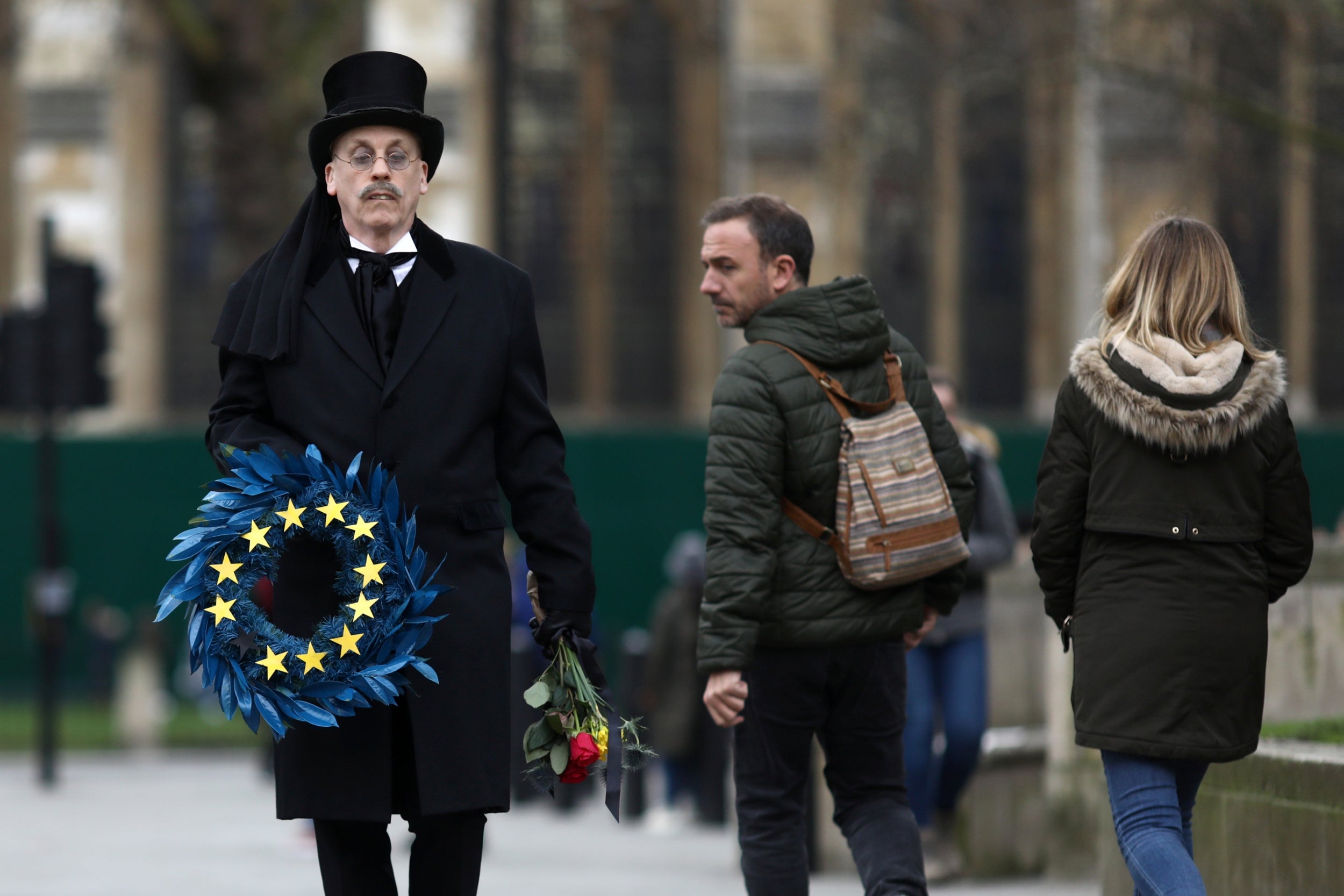
48/66
A man carries an EU themed wreath
Reuters
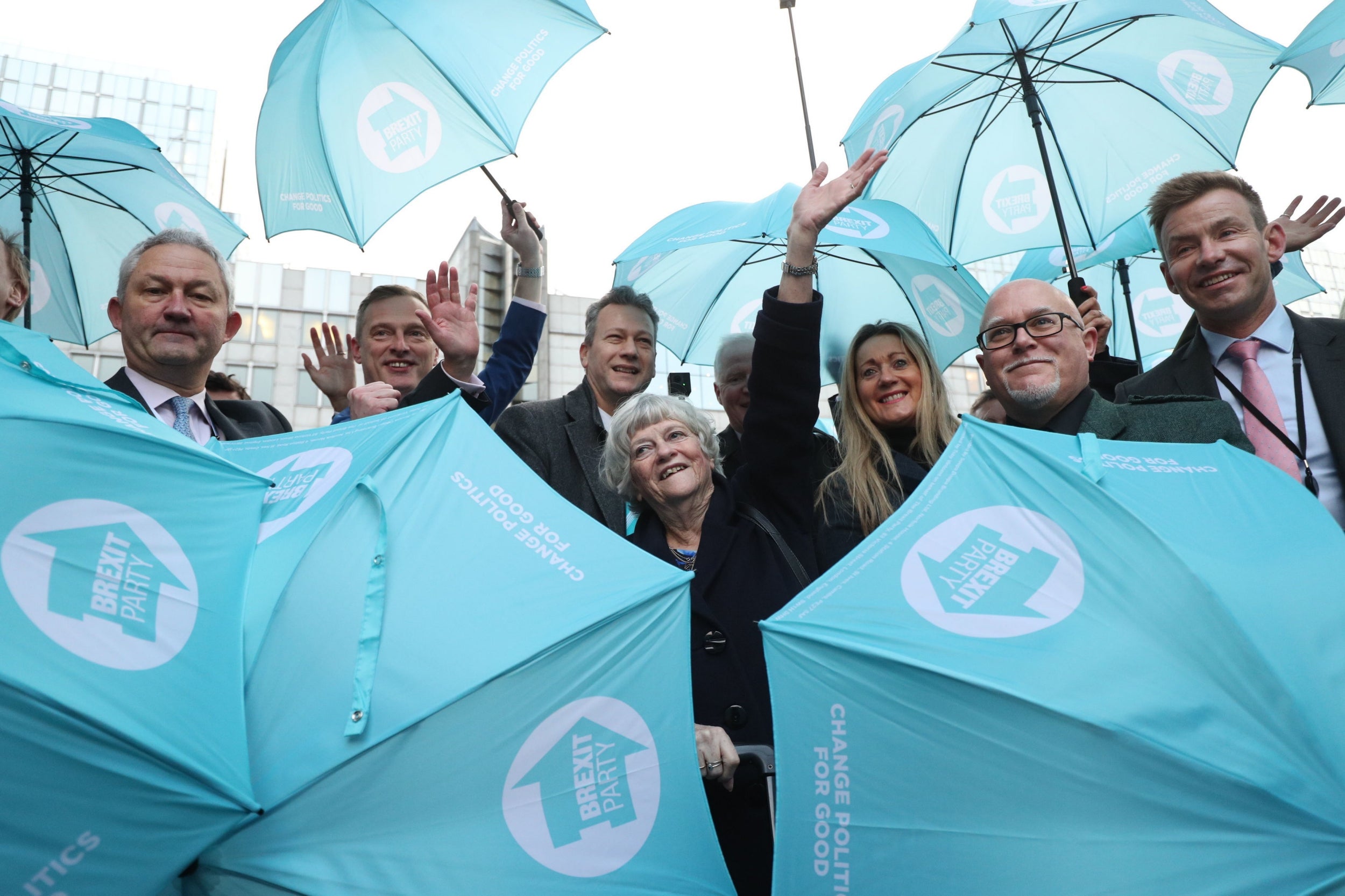
49/66
Ann Widdecombe reacts with other members of the Brexit party as they leave en masse from the European Parliament
PA
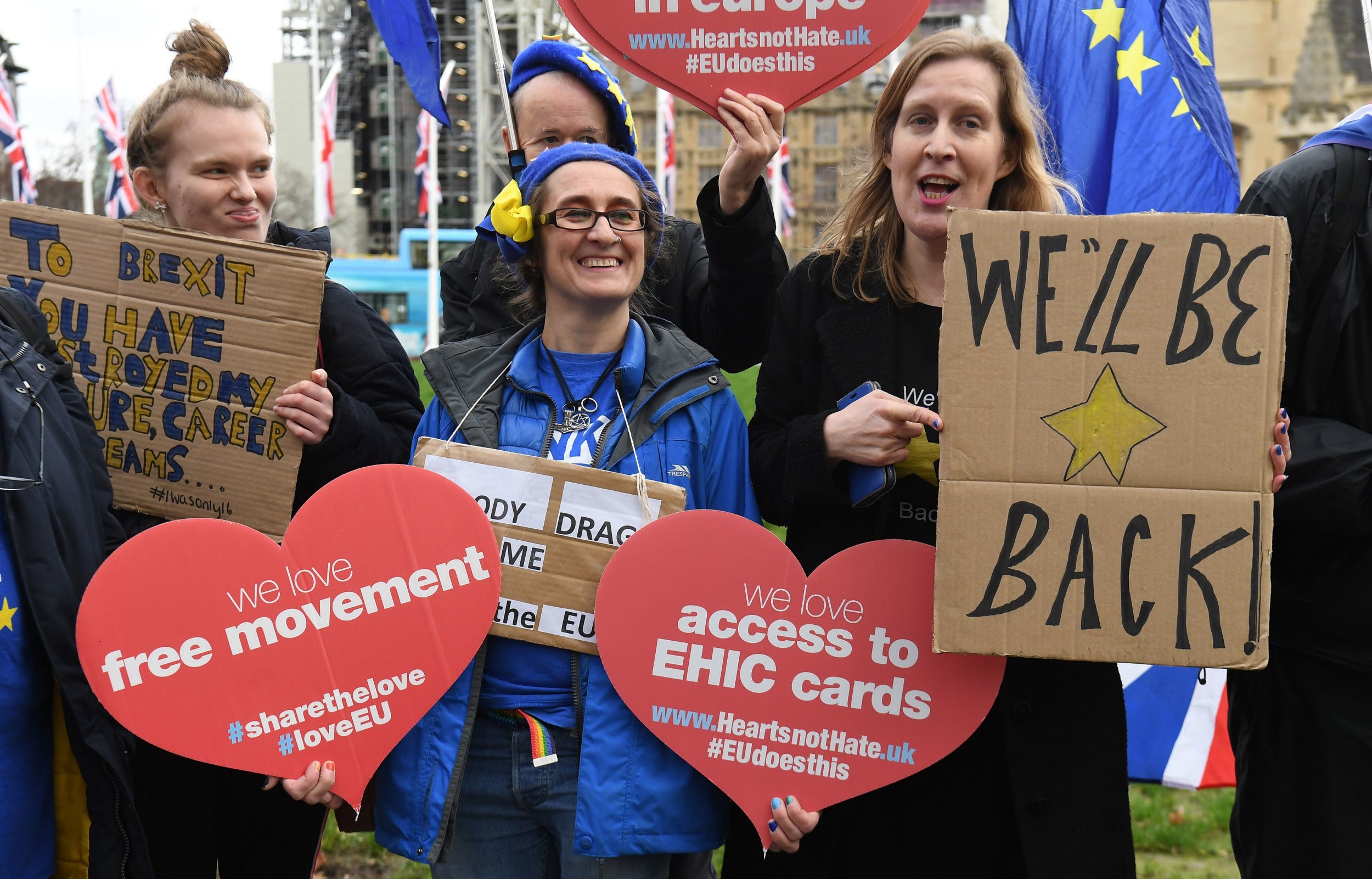
50/66
Anti-Brexit demonstrators in Parliament Square
PA

51/66
Pro EU supporters let off flares from Westminster Bridge
Getty
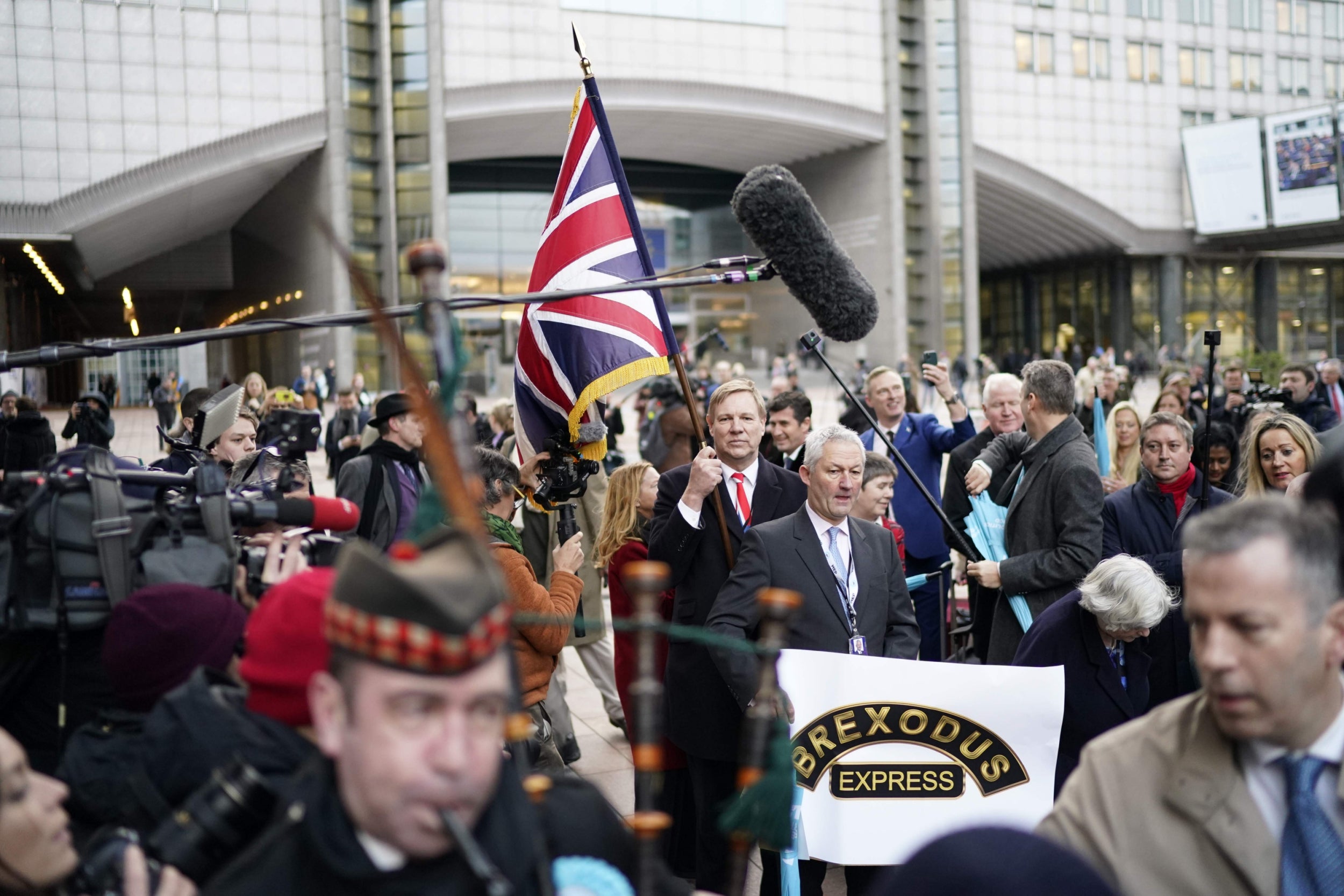
52/66
British MEPs Jonathan Bullock, holding the Union Jack flag and Jake Pugh leave the European Parliament, in Brussels on the Brexit day
AFP via Getty
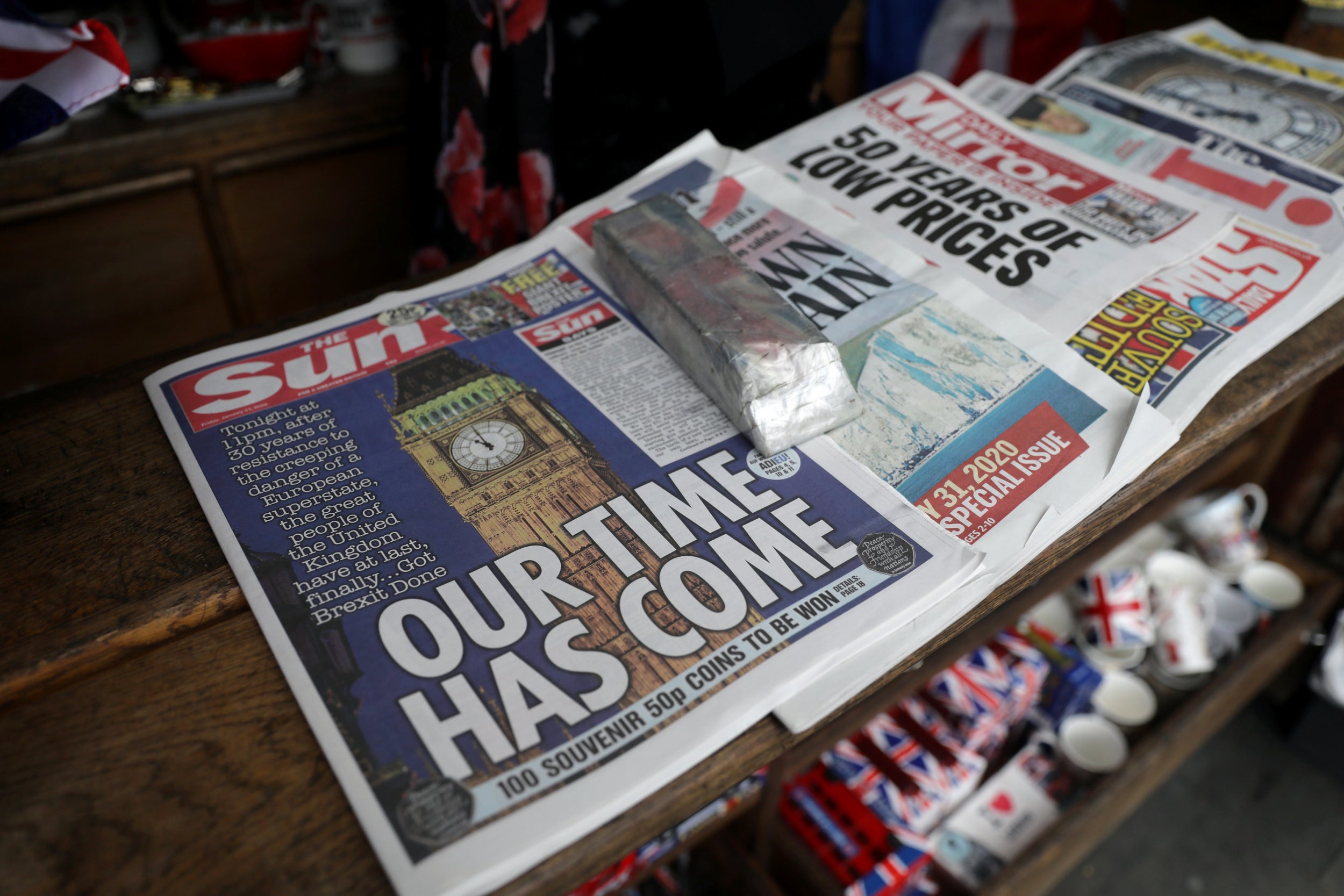
53/66
Newspapers and other souvenirs at a store, near Parliament Square
Reuters
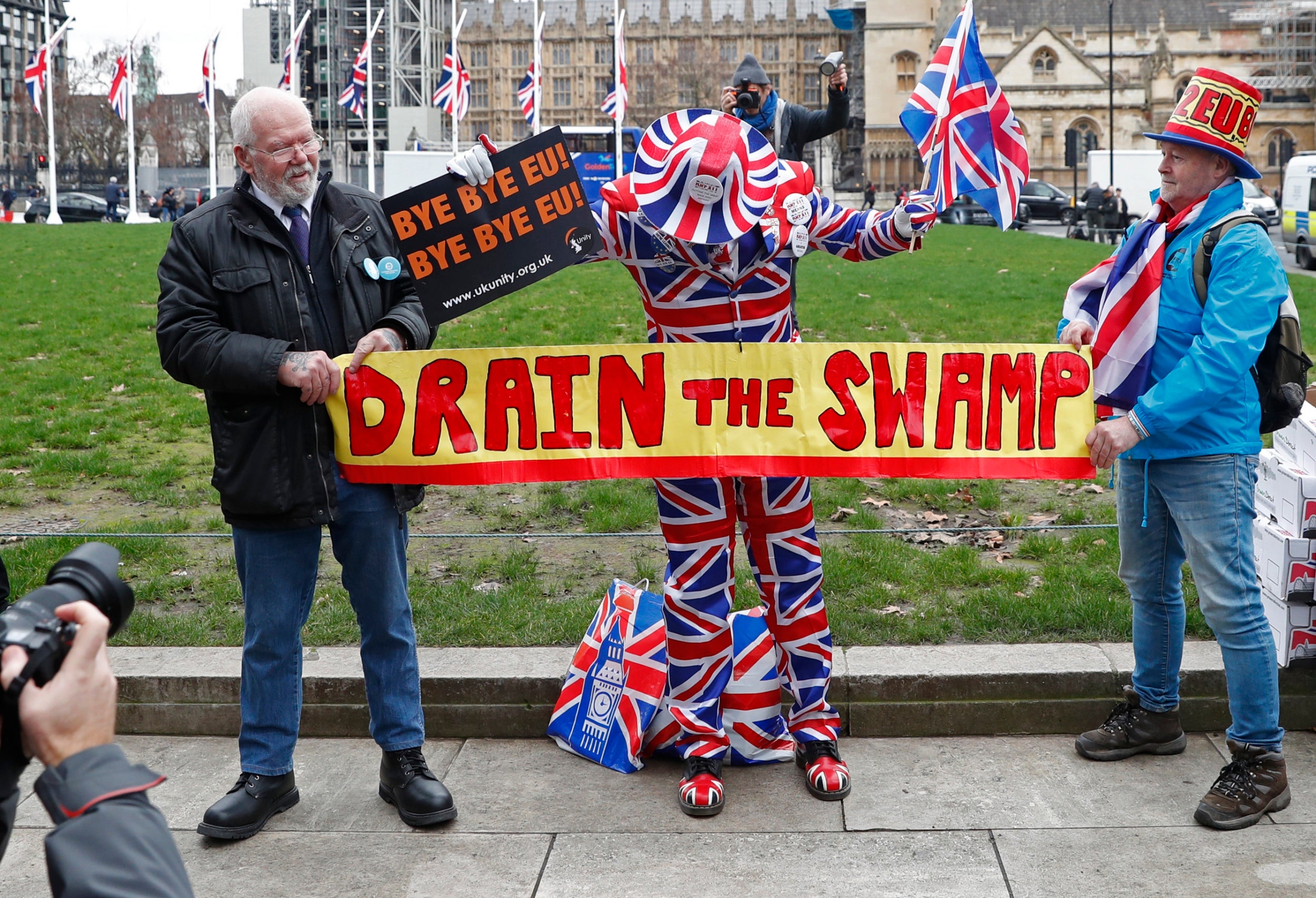
54/66
Brexit supporters hold signs in Parliament Square
AP
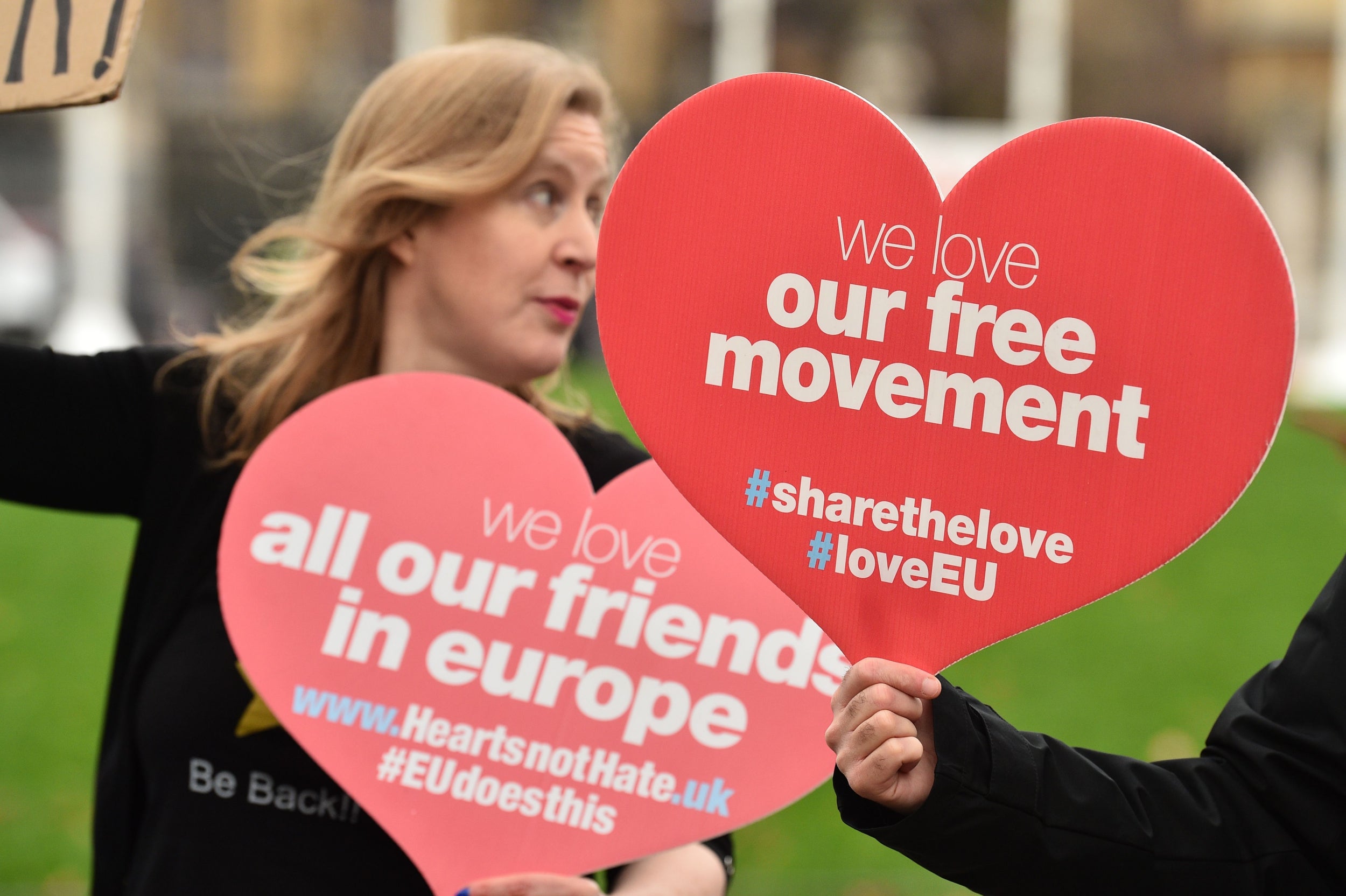
55/66
Pro-EU protesters hold placards in Parliament Square
AFP via Getty
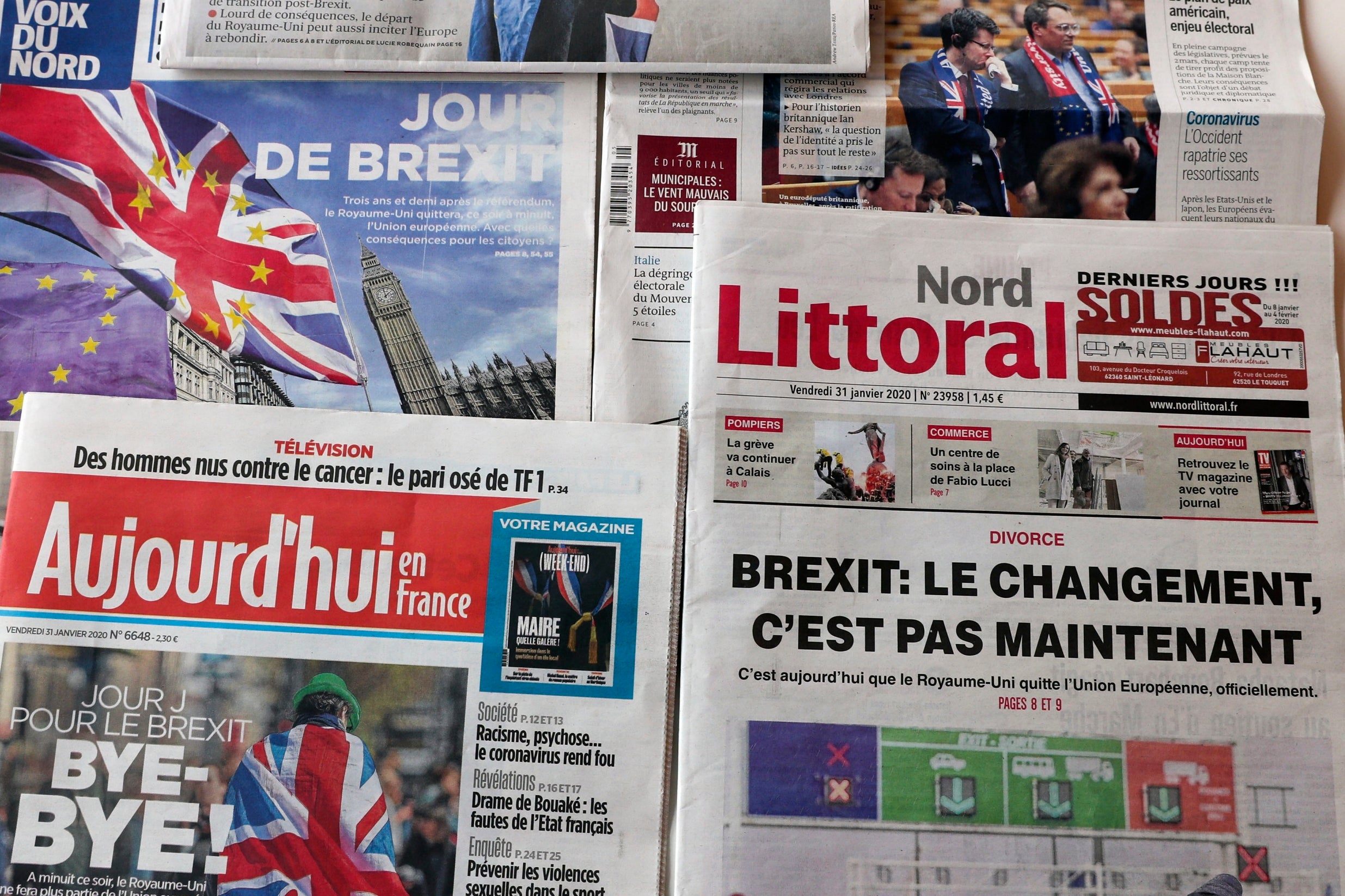
56/66
French newspapers
PA

57/66
Sinn Fein leader Mary Lou McDonald with a Border Communities Against Brexit poster before its unveiling in Carrickcarnon on the Irish border
PA
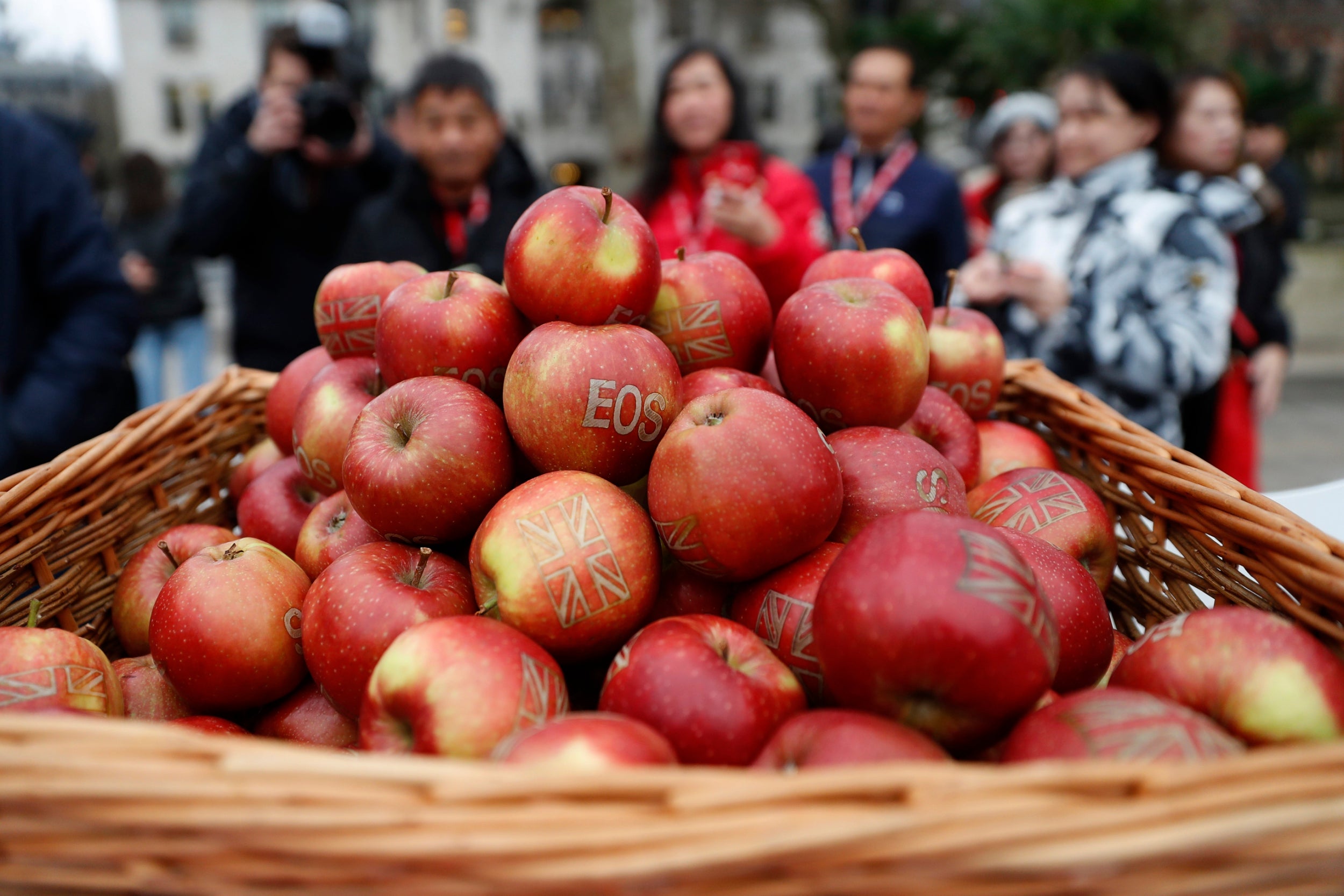
58/66
National growers organisation British Apples & Pears has renamed a British apple to EOS, the Greek goddess of dawn, to commemorate Brexit day
AP
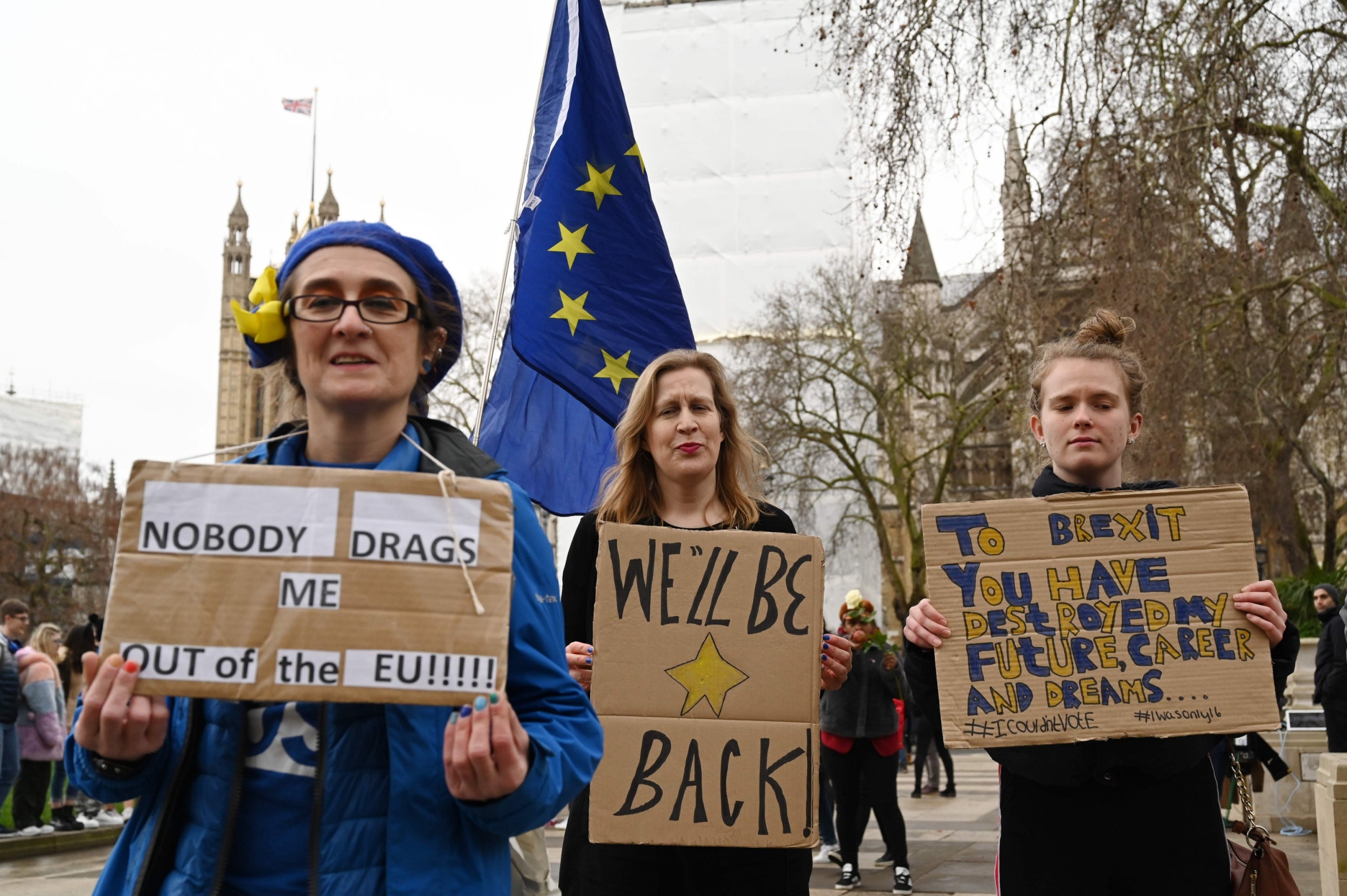
59/66
Pro-EU protesters hold placards in Parliament Square
AFP via Getty
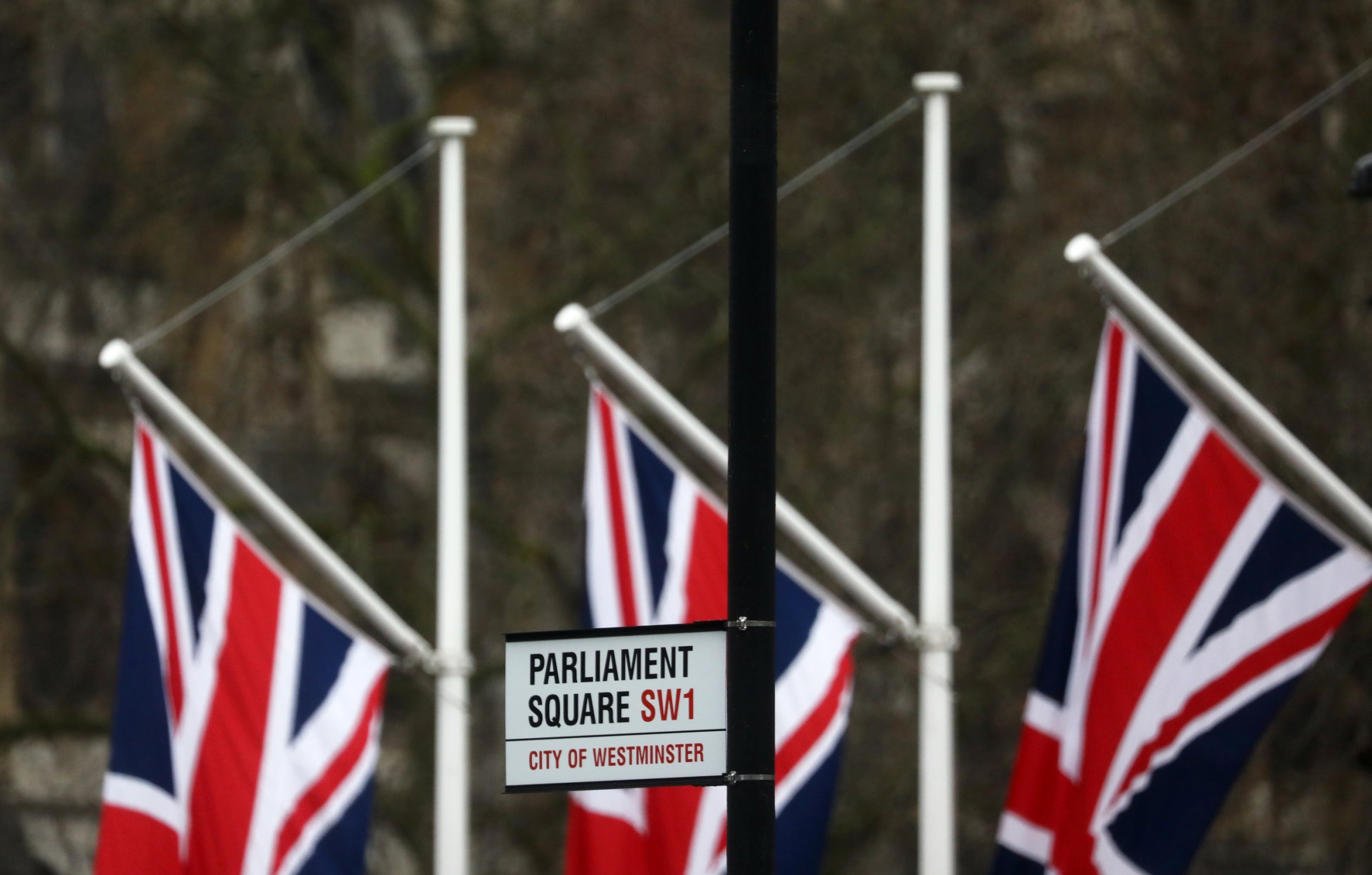
60/66
Britain’s departure from the European Union was set in law on January 29, amid emotional scenes, as the bloc’s parliament voted to ratify the divorce papers. After half a century of membership and three years of tense withdrawal talks, the UK will leave the EU at midnight Brussels time (23.00 GMT) on January 31
Reuters
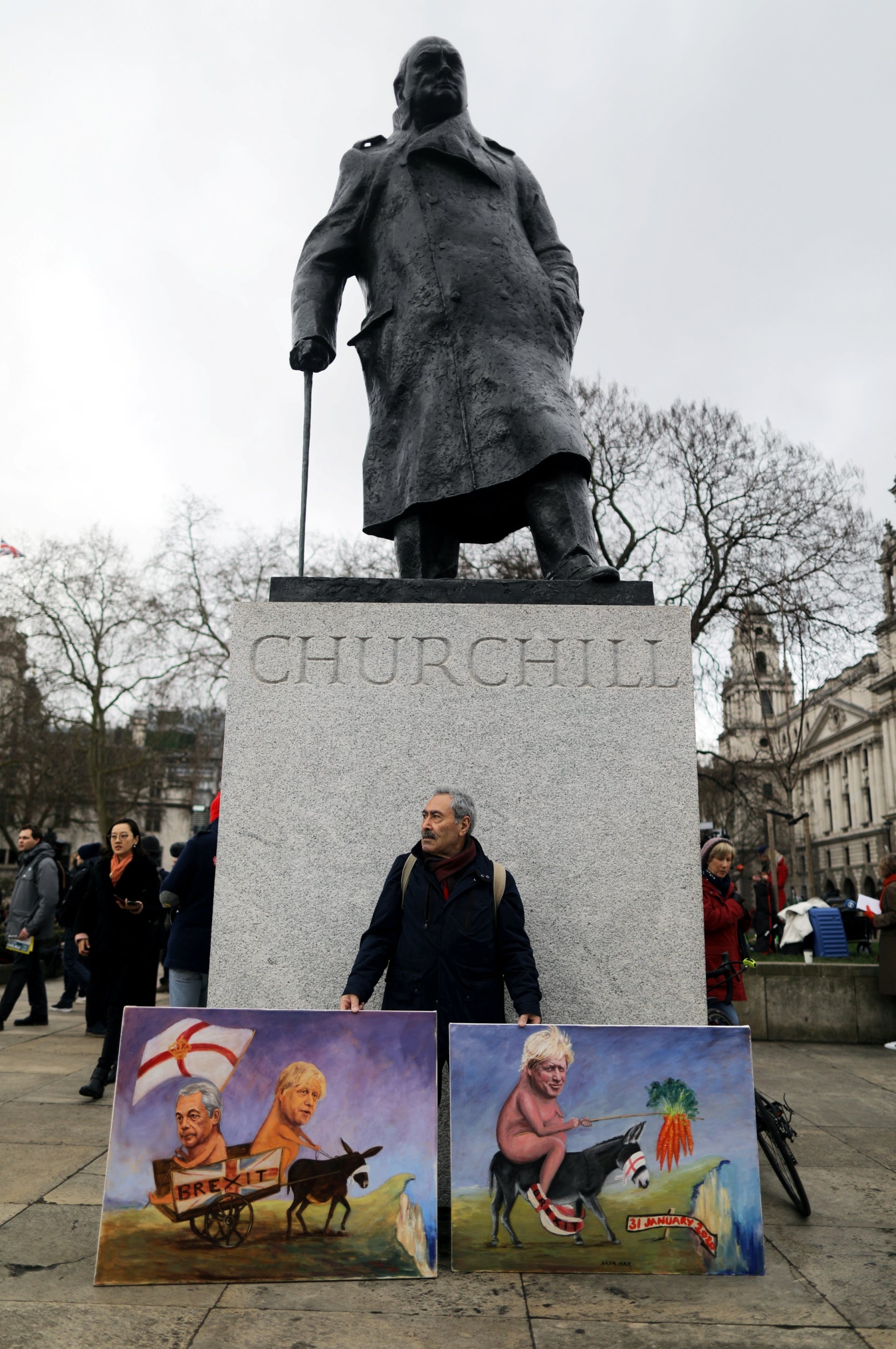
61/66
A man poses with paintings on Parliament Square
Reuters
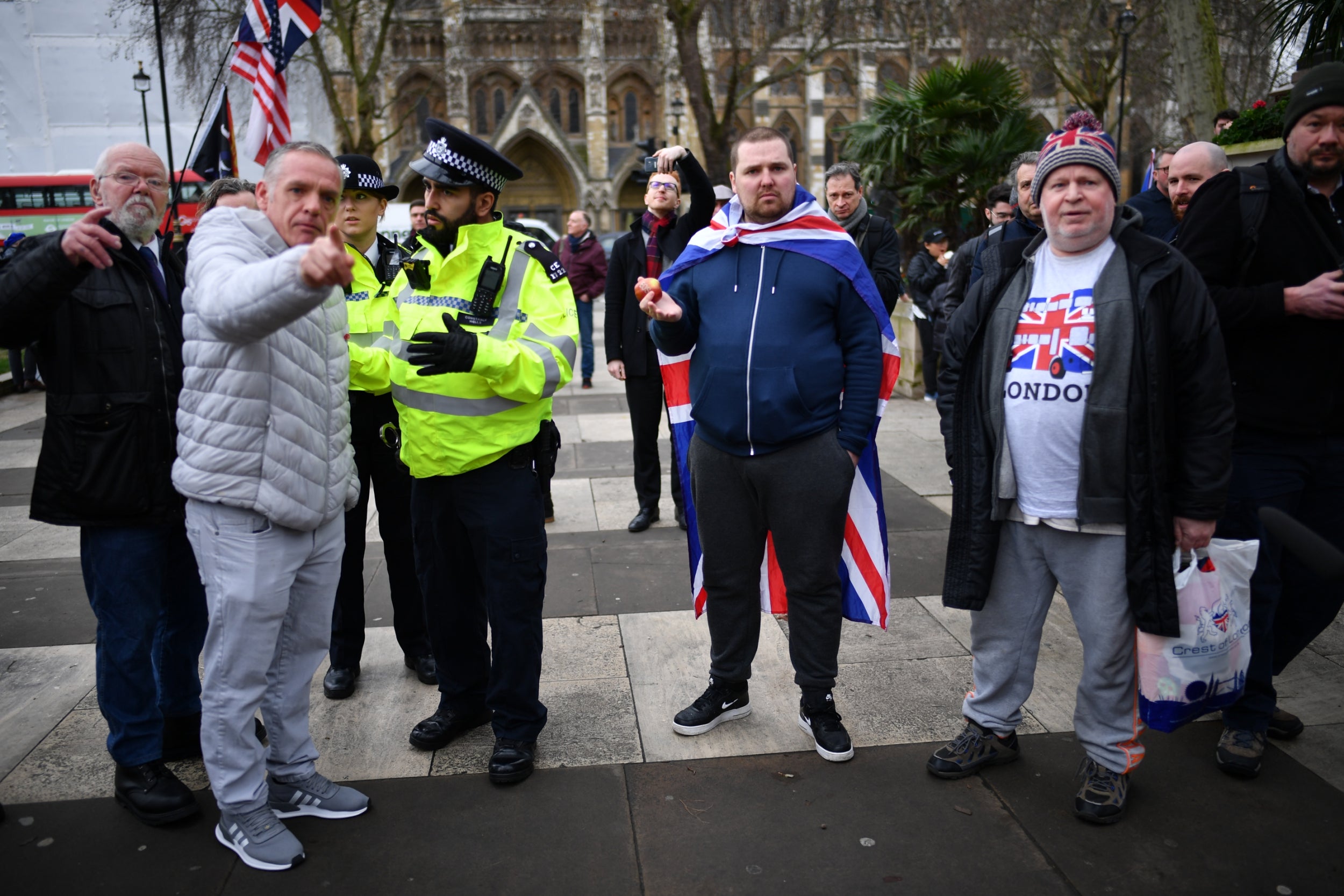
62/66
People sporting Union Flags gather in Parliament Square
Getty

63/66
A man walks with a St. George’s flag at Westminster bridge on Brexit day
Reuters

64/66
A British bulldog toy and other souvenirs at a souvenir store
Reuters
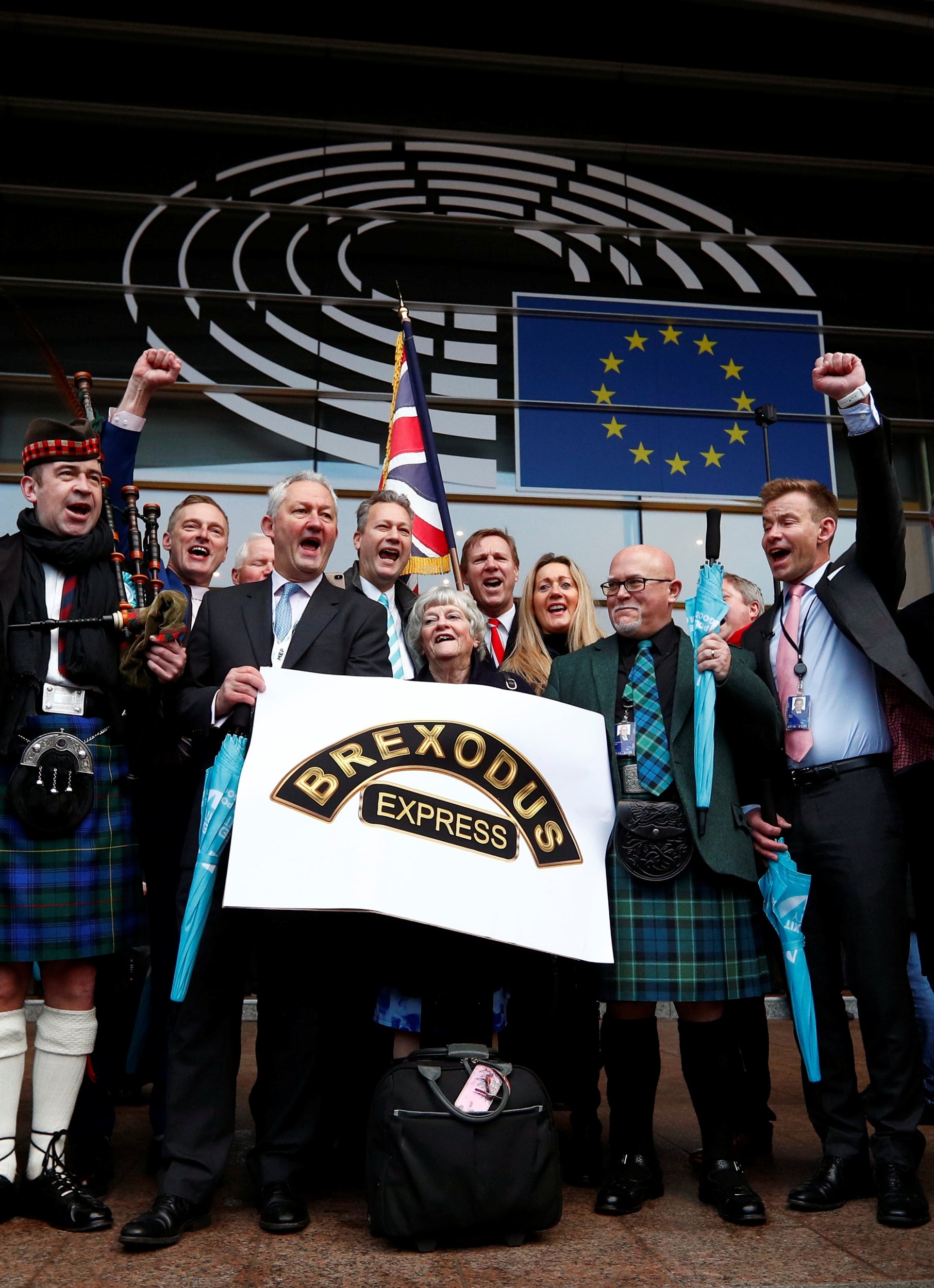
65/66
British pro-brexit Members of the European Parliament leave the EU Parliament for the last time
Reuters
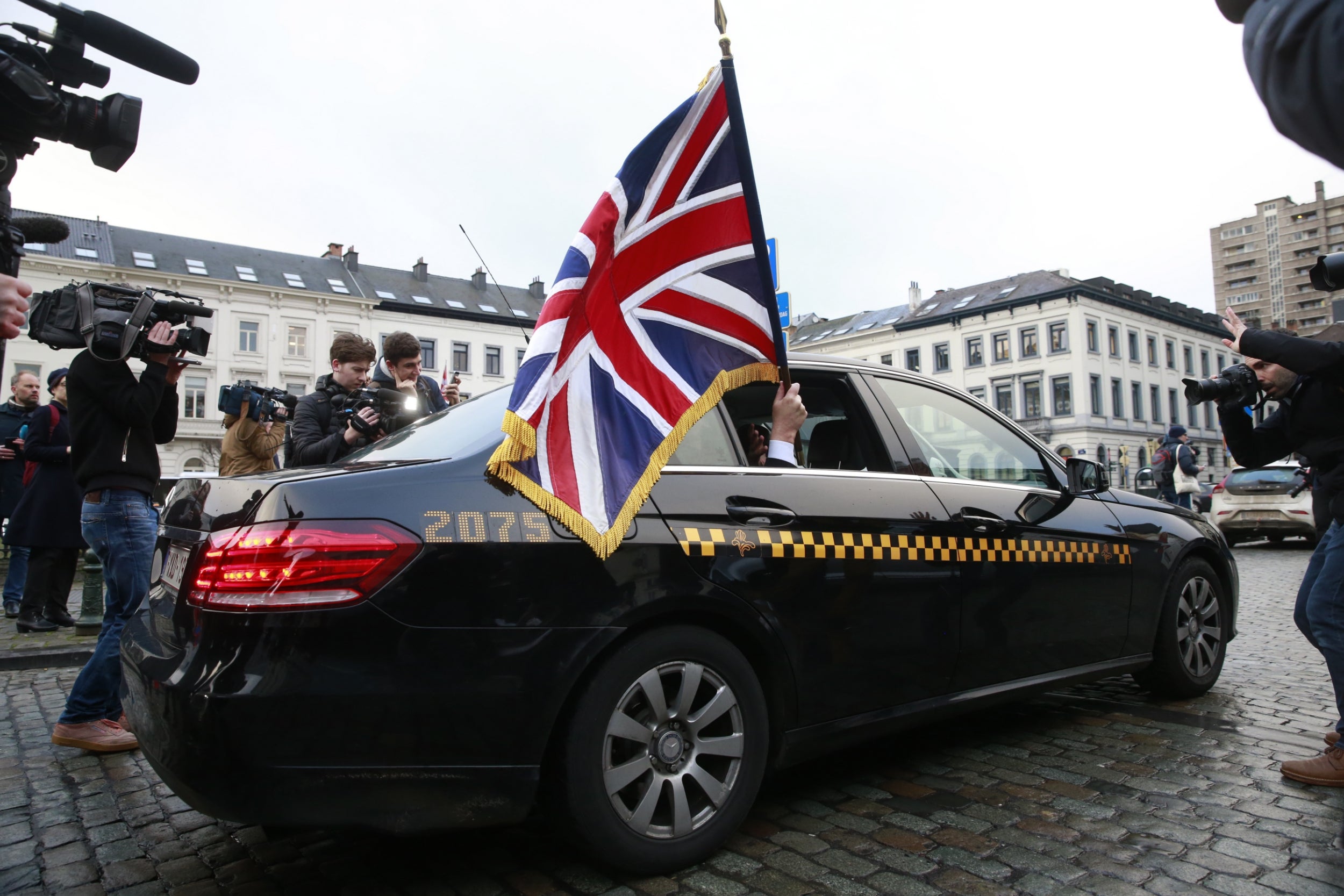
66/66
Jonathan Bullock waves the Union Jack as he leaves the European Parliament
EPA

1/66
A message projected onto the White Cliffs of Dover
Sky News/AFP via Getty

2/66
Getty

3/66
Big Ben, shows the hands at eleven o’clock at night
AFP via Getty Images

4/66
Nigel Farage speaks to pro-Brexit supporters
PA

5/66
Pro-Brexit demonstrators celebrate on Parliament Square
REUTERS

6/66
The Union flag is taken down outside the European Parliament in Brussels
PA

7/66
Pro-EU campaigners outside the Scottish Parliament, Edinburgh
PA

8/66
A pro-Brexit supporter jumps on an EU flag in Parliament Square
PA

9/66
EU Council staff removed the Union Jack-British flag from the European Council in Brussels, Belgium
EPA

10/66
A pro-Brexit supporter pours beer onto an EU flag
PA

11/66
Pedestrians pass in front of the Ministry of Defence Building on Whitehall, illuminated by red, white and blue lights in central London
AFP via Getty Images

12/66
A Brexit supporter shouts during a rally in London
AP

13/66
Pro-EU campaigners outside the Scottish Parliament, Edinburgh
PA

14/66
Pro-EU campaigners take part in a ‘Missing EU Already’ rally outside the Scottish Parliament, Edinburgh
PA

15/66
A large pro-EU banner is projected onto Ramsgate cliff in Kent
PA

16/66
Pro-EU supporters light candles in Smith Square in Westminster
PA

17/66
A man waves Union flags from a small car as he drives past Brexit supporters gathering in Parliament Square
AFP via Getty Images

18/66
The five-year old Elisa Saemann, left, and her seven-year old sister Katie hold a placard during a rally by anti-Brexit protesters outside the Scottish parliament in Edinburgh
AP

19/66
Pro Europe supporters gather on Brexit day near the British embassy in Berlin, Germany
EPA

20/66
Anti-Brexit protester hugs a man while holding a placard
REUTERS

21/66
A decorated, old fashioned fire pump in Parliament Square
PA

22/66
Pro Brexit Elvis impersonator performs at Parliament Square
Getty Images

23/66
An anti-Brexiteers stands with his dog in Parliament Square
AFP via Getty Images

24/66
Paddy from Bournemouth wears Union colours as he sits next to an EU flag decorated bag in Parliament Square
AFP via Getty Images

25/66
A pro-EU activist plays a guitar decorated with the EU flag during a protest organised by civil rights group New Europeans outside Europe House, central London
AFP via Getty Images

26/66
People celebrate Britain leaving the EU
REUTERS

27/66
A Pro Brexit supporter has a Union Jack painted onto his face at Parliament Square
Getty Images

28/66
Men hold placards celebrating Britain leaving the EU
REUTERS

29/66
Pro Brexit supporters dance in the street draped with Union Jack flags at Parliament Square
Getty Images

30/66
An anti-Brexit demonstrator spreads his wings during a gathering near Downing Street
AP

31/66
Pro EU supporters display a banner ‘ Here to Stay, Here to Fight, Migrants In, Tories Out’ from Westminster bridge
EPA

32/66
Pro-Brexit supporters burn European Union flags at Parliament Square
Getty

33/66
A man poses for a picture on Parliament Square in a ‘Brexit Day’ t-shirt
Reuters

34/66
People celebrate Britain leaving the EU
Reuters

35/66
AFP via Getty

36/66
A man wears a pro-Brexit t-shirt
Reuters

37/66
Anti-Brexit demonstrators visit Europe House to give flowers to the staff on Brexit day
Reuters

38/66
Pro Brexit supporter wears a novelty Union Jack top hat outside the Houses of Parliament
Getty Images

39/66
Customers Scott Jones and Laura Jones at the Sawmill Bar in South Elmsall, Yorkshire, where a Brexit party is being held throughout the day
PA

40/66
AP

41/66
Getty

42/66
Getty Images

43/66
Pro-EU activists protest
Getty Images

44/66
A pro-Brexit demonstrator burns a European Union flag
AP

45/66
Pro Brexit supporters
Getty Images

46/66
Pro Brexit supporters
Getty Images

47/66
A Brexit supports holds a sign in Parliament Square
AP

48/66
A man carries an EU themed wreath
Reuters

49/66
Ann Widdecombe reacts with other members of the Brexit party as they leave en masse from the European Parliament
PA

50/66
Anti-Brexit demonstrators in Parliament Square
PA

51/66
Pro EU supporters let off flares from Westminster Bridge
Getty

52/66
British MEPs Jonathan Bullock, holding the Union Jack flag and Jake Pugh leave the European Parliament, in Brussels on the Brexit day
AFP via Getty

53/66
Newspapers and other souvenirs at a store, near Parliament Square
Reuters

54/66
Brexit supporters hold signs in Parliament Square
AP

55/66
Pro-EU protesters hold placards in Parliament Square
AFP via Getty

56/66
French newspapers
PA

57/66
Sinn Fein leader Mary Lou McDonald with a Border Communities Against Brexit poster before its unveiling in Carrickcarnon on the Irish border
PA

58/66
National growers organisation British Apples & Pears has renamed a British apple to EOS, the Greek goddess of dawn, to commemorate Brexit day
AP

59/66
Pro-EU protesters hold placards in Parliament Square
AFP via Getty

60/66
Britain’s departure from the European Union was set in law on January 29, amid emotional scenes, as the bloc’s parliament voted to ratify the divorce papers. After half a century of membership and three years of tense withdrawal talks, the UK will leave the EU at midnight Brussels time (23.00 GMT) on January 31
Reuters

61/66
A man poses with paintings on Parliament Square
Reuters

62/66
People sporting Union Flags gather in Parliament Square
Getty

63/66
A man walks with a St. George’s flag at Westminster bridge on Brexit day
Reuters

64/66
A British bulldog toy and other souvenirs at a souvenir store
Reuters

65/66
British pro-brexit Members of the European Parliament leave the EU Parliament for the last time
Reuters

66/66
Jonathan Bullock waves the Union Jack as he leaves the European Parliament
EPA
“UK consumers have a legitimate fear that two decades of progress on food safety and animal welfare could be traded away in just two weeks of negotiations with the US,” warned Sue Davies, its head of consumer protection.
The latest news on Brexit, politics and beyond direct to your inbox
The criticism reflects evidence that washing chicken in chlorine – as well as being an animal welfare issue – poses food safety risks because it does not remove bacteria and masks other dangerous practices.
Critics have highlighted the risk of food poisoning from cross-contamination with the deadly bacteria salmonella and campylobacter, because of poor standards when the UK was an EU member.
That ban will be transferred to UK law at the end of the Brexit transition period in December, but Ms Truss has made clear it will be up to MPs whether to then lift it.
The government enjoyed an 80-strong majority and has refused to impose the same food safety standards in the Agriculture Bill currently going through parliament – despite a Tory revolt.
In her letter, Ms Davies wrote: “This weaker approach risks both destroying the public’s trust in trade deals and leaving our future national approach to food entirely compromised.
“We therefore urge you to listen to the British public who value the UK’s high food standards and ensure that they are upheld in the negotiations.”



